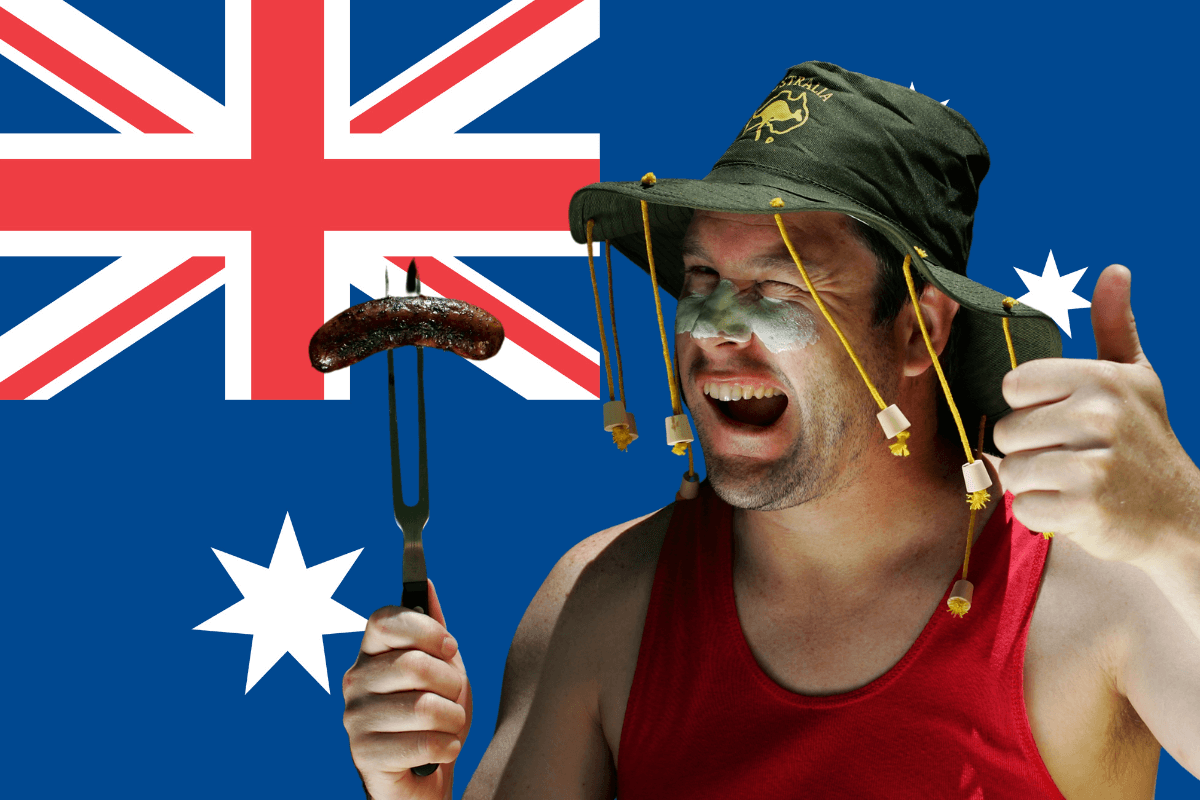Gidday Mate! Strewth! A flamin’ article about Aussie Slang and Phrases? Fair Dinkum?
Australia is the land of sharks, spiders, snakes, kangaroos, koalas, beaches and BBQ’s.

This article will be your ultimate guide to Australian slang and will have you talking like you’re on “Neighbours” or “Home and Away” faster than you can say Harold Bishop or Alf Stewart!
Let’s get into it!
A B C D E F G H I J K L M N O P Q R S T U V W X Y Z
Australian slang terms starting with A
A Cold One
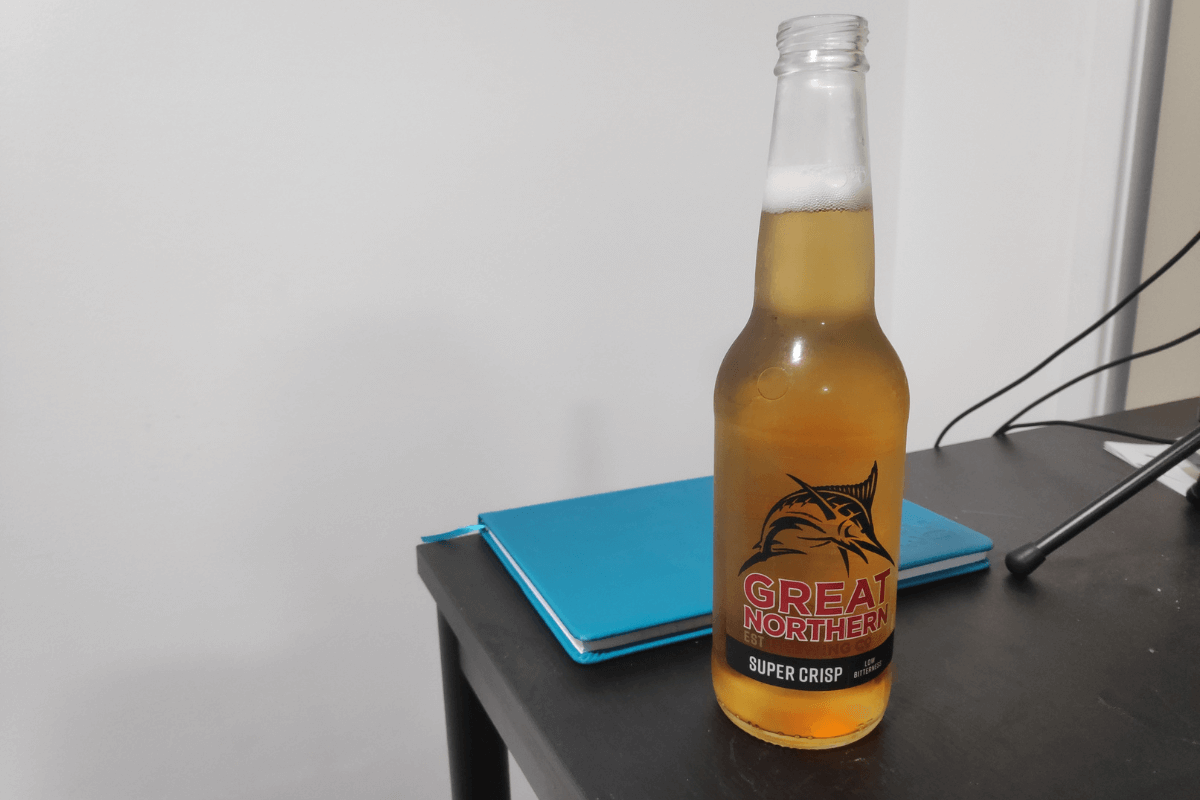
“A cold one” is a commonly used Australian phrase referring to a cold beer.
It’s a staple in Aussie culture, especially after a long day or during a social gathering.
Examples in sentences:
- “After work, I could really go for a cold one.”
- “Let’s crack open a cold one and relax.”
- “The pub was packed with people enjoying a cold one.”
- “He always keeps a cold one in the fridge.”
- “Nothing beats a cold one on a hot summer day.”
Accadacca
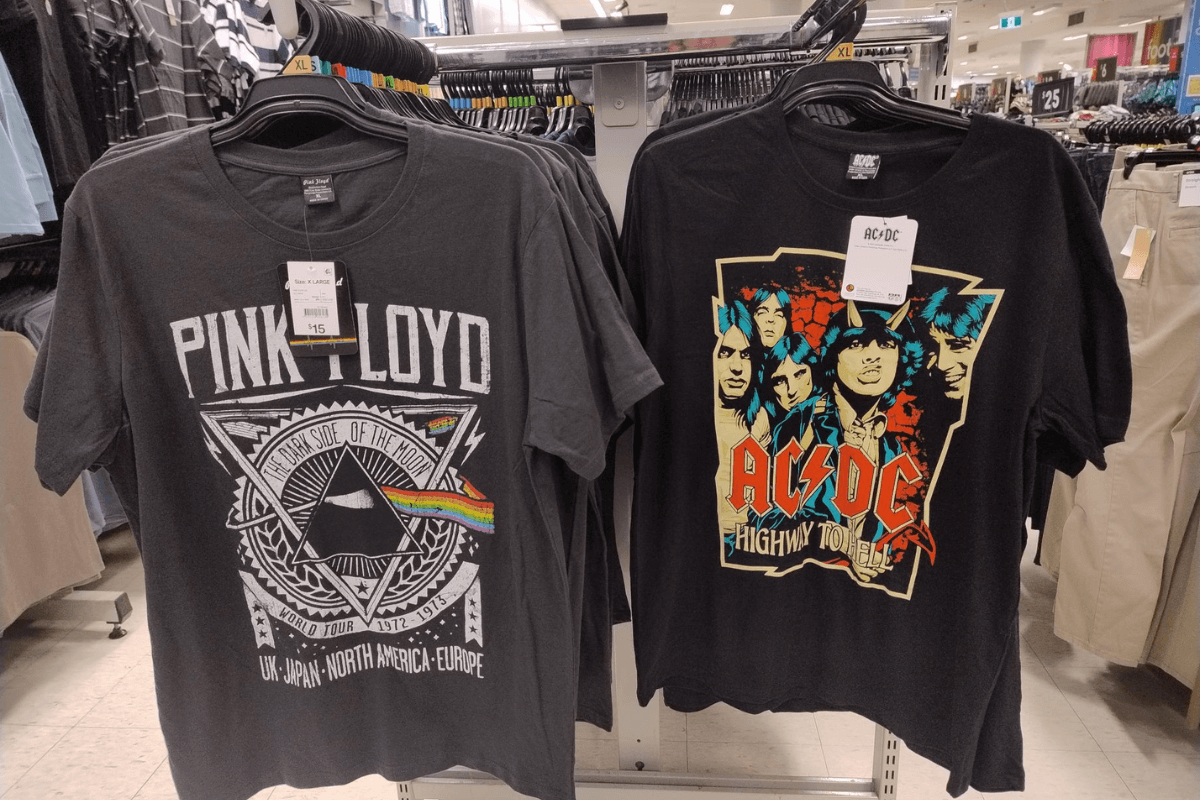
“Accadacca” is the affectionate nickname Australians use for the iconic rock band AC/DC.
Known for their high-energy performances and legendary hits, the term reflects the Aussie’s love for abbreviations and playful language.
Examples in sentences:
- “I’m going to see Accadacca live this weekend.”
- “Accadacca is one of the greatest rock bands in history.”
- “Put on some Accadacca, mate, let’s rock out!”
- “Every Aussie knows at least one Accadacca song.”
- “Accadacca’s music never gets old.”
Ace
“Ace” is a common Australian slang term used to describe something that’s fantastic or of top quality. It’s often used as an exclamation to express excitement or approval.
Examples in sentences:
- “That movie was ace, I’d watch it again!”
- “You did an ace job on that project, well done.”
- “The surf conditions were ace this morning.”
- “He’s an ace guitarist, one of the best I’ve heard.”
- “It’s ace to finally have some good news.”
Aggro
“Aggro” is used to describe someone who is angry or showing aggressive behavior.
It’s a casual way to point out tension or frustration in a situation, commonly heard in both Australian and British slang.
Examples in sentences:
- “He got a bit aggro after losing the game.”
- “Don’t get aggro over something so small.”
- “The crowd started getting aggro during the concert.”
- “She’s always aggro when she’s tired.”
- “The argument turned a bit aggro, so I left.”
Air Con
“Air Con” is the Aussie abbreviation for air conditioning, commonly used in casual conversation to refer to cooling systems, especially during the hot summer months.
Examples in sentences:
- “The air con is a lifesaver in this heat.”
- “Can you turn on the air con? It’s getting stuffy in here.”
- “We installed new air con in the living room.”
- “The office air con is broken again.”
- “It’s too hot to sleep without the air con on.”
Amber Nectar
“Amber Nectar” is a popular Aussie expression used to describe beer, emphasizing its golden color and refreshing quality.
It’s often used in a celebratory or enthusiastic context when referring to a beer.
Examples in sentences:
- “Pass me some of that amber nectar, mate.”
- “After a hot day, there’s nothing like a sip of amber nectar.”
- “The pub was flowing with amber nectar during the game.”
- “He cracked open a bottle of amber nectar to celebrate.”
- “Aussies sure love their amber nectar.”
Ambo

“Ambo” is a commonly used Aussie term referring to an ambulance or the paramedics who work in one.
It’s a familiar and casual way of referring to those who provide emergency medical assistance.
Examples in sentences:
- “The ambo arrived within minutes after the accident.”
- “Call an ambo, we need help here!”
- “The ambo crew did an amazing job saving his life.”
- “I’ve always wanted to be an ambo and help people.”
- “The ambo rushed her to the hospital.”
Ankle Biter

The term “ankle biter” is a humorous way to refer to young children, typically toddlers who are at the height of your ankles and might be, well, a bit of a handful.
Picture a tiny human constantly on the move, grabbing at everything, and you’ve got yourself an ankle biter!
Examples in sentences:
- “Watch out for the ankle biters at the party—they’re all over the place!”
- “I’ve got two ankle biters at home, so I’m always on my toes.”
- “The park was full of ankle biters running around.”
- “It’s hard to get anything done with these ankle biters underfoot.”
- “Ankle biters can be a handful, but they sure are cute!”
Arvo

“Arvo” is a widely used Australian slang term that’s short for afternoon.
Whether you’re planning to catch up with mates or just enjoying a relaxing day, you’re sure to hear this term often in Australia.
Examples in sentences:
- “Let’s meet up this arvo for a coffee.”
- “I’ll finish this by arvo and give you a call.”
- “What are you doing this arvo? Fancy a swim?”
- “We had a lazy arvo at the beach.”
- “The arvo sun was still warm and inviting.”
Aussie
“Aussie” is a widely used term for Australians or anything associated with Australia.
It’s often used informally and affectionately to refer to the people, the country, or the culture.
Examples in sentences:
- “He’s a true blue Aussie, born and raised.”
- “The Aussie spirit is all about mateship and helping each other out.”
- “I’ve always wanted to visit the Aussie outback.”
- “She’s got a strong Aussie accent.”
- “Aussie rules football is a popular sport down under.”
Aussie Salute
The “Aussie salute” refers to the constant hand motion Australians make to wave away pesky flies. It’s a lighthearted term that pokes fun at the Australian outback’s frequent fly-swatting necessity.
Examples in sentences:
- “We were doing the Aussie salute all day during our hike.”
- “Flies were everywhere, so we had to resort to the Aussie salute.”
- “The outback really makes you master the Aussie salute.”
- “He kept doing the Aussie salute during the BBQ.”
- “It’s hard to enjoy a picnic without performing the Aussie salute.”
Av a Go
“Av a Go” is a casual Australian phrase used to encourage someone to try something, even if they might not be confident or skilled at it. It’s all about giving it a shot and having a go, regardless of the outcome.
Examples in sentences:
- “Come on mate, av a go at it, you might surprise yourself!”
- “He was hesitant at first, but I told him to just av a go.”
- “You’ll never know unless you av a go.”
- “Everyone was watching, so I thought, why not av a go.”
- “She always says, ‘av a go and don’t be afraid of failing’.”
Avo
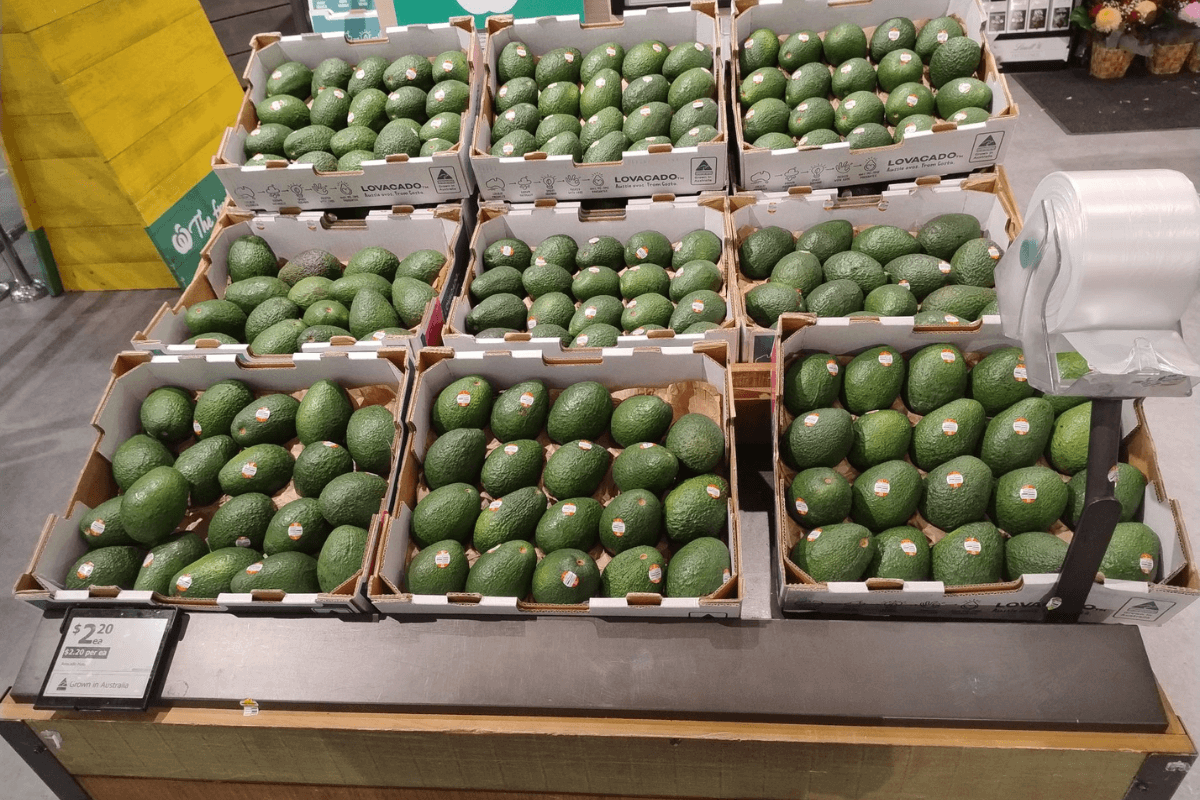
“Avo” is the short, friendly term Aussies use for avocado.
If you’re in Australia, you’ll see it pretty much everywhere.
It’s on toast, in a salad, or just as a snack, an avo is a beloved staple in many Australian diets.
Examples in sentences:
- “I’ll have avo on toast for breakfast.”
- “Can you grab an avo from the store?”
- “Nothing beats a fresh avo with a bit of salt and pepper.”
- “The avo tree in our backyard is full of fruit.”
- “Avo is a key ingredient in my favorite salad.”
Australian slang terms starting with B
Back of Bourke
“Back of Bourke” is a quintessential Australian slang term used to describe a place that is very far away or in the middle of nowhere. Bourke is a town in New South Wales, and anything beyond it is considered extremely remote.
Examples in sentences:
- “He lives out the back of Bourke, nowhere near any towns.”
- “That farm is so isolated, it might as well be the back of Bourke.”
- “We took a road trip to the back of Bourke, where we didn’t see anyone for miles.”
- “You’ll find some real hidden gems if you head out to the back of Bourke.”
- “It feels like the back of Bourke out here, not a soul in sight.”
Bail
When someone “bails” in Australia, they’re backing out or canceling plans, often at the last minute.
It’s a common phrase for those unexpected change of plans.
Examples in sentences:
- “Sorry, I’ve got to bail on dinner tonight.”
- “He bailed on the movie at the last minute.”
- “Don’t bail on me now, we’re almost there!”
- “She always bails when it’s time to do the hard work.”
- “I hate to bail, but something came up.”
Banana Bender
“Banana Bender” is a light-hearted, colloquial term used to refer to people from Queensland, Australia. The nickname comes from Queensland’s reputation for growing bananas and plays on the idea that people from the state spend their time bending bananas.
Examples in sentences:
- “He’s a proud banana bender, born and raised in Queensland.”
- “The banana benders love their tropical climate.”
- “She moved from Sydney to Queensland and became a banana bender.”
- “Banana benders are known for their laid-back attitude.”
- “You’ll find plenty of banana benders at the footy match.”
Banger
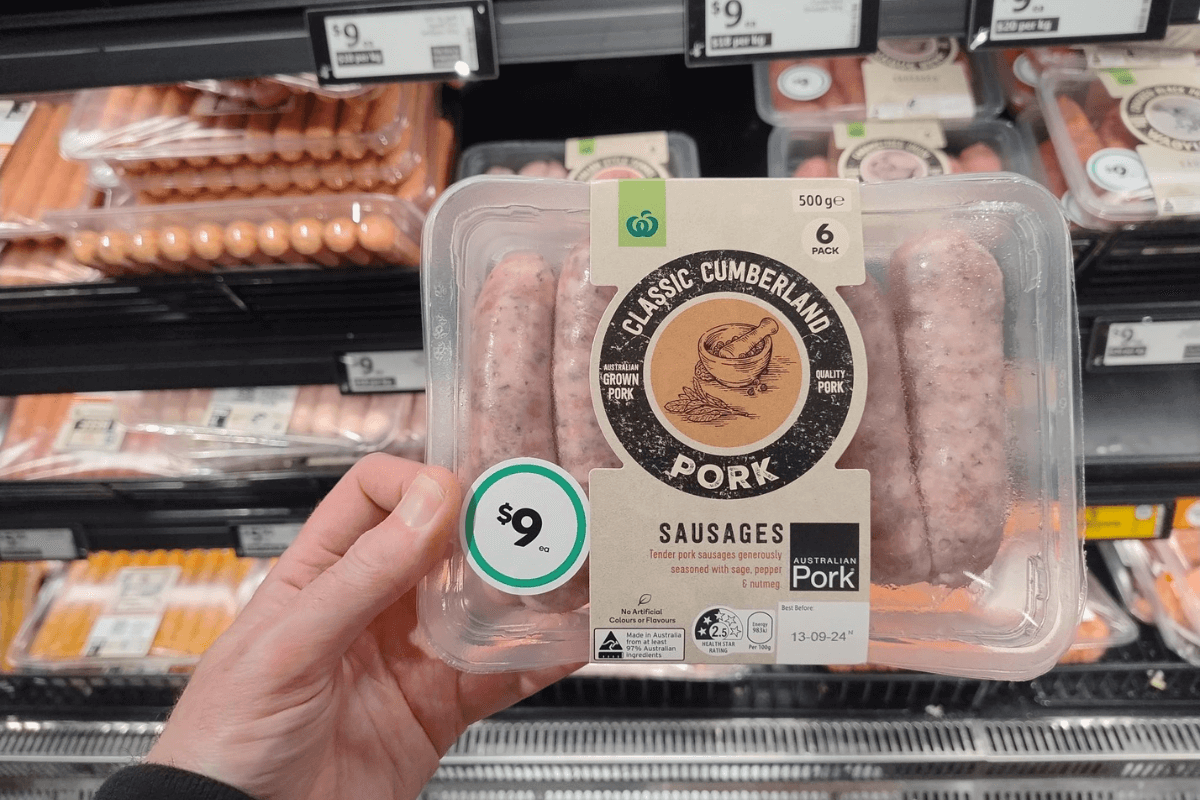
“Banger” is Aussie slang for a sausage, often used when talking about barbecues or simple meals. The term likely comes from the tendency of sausages to “bang” or burst during cooking in the past when they contained a lot of water.
Examples in sentences:
- “Throw some bangers on the barbie for dinner.”
- “We had bangers and mash for lunch today.”
- “He grabbed a couple of bangers from the butcher for the BBQ.”
- “The kids love eating bangers in a bread roll.”
- “I’ll cook up some bangers for breakfast tomorrow.”
Barbie
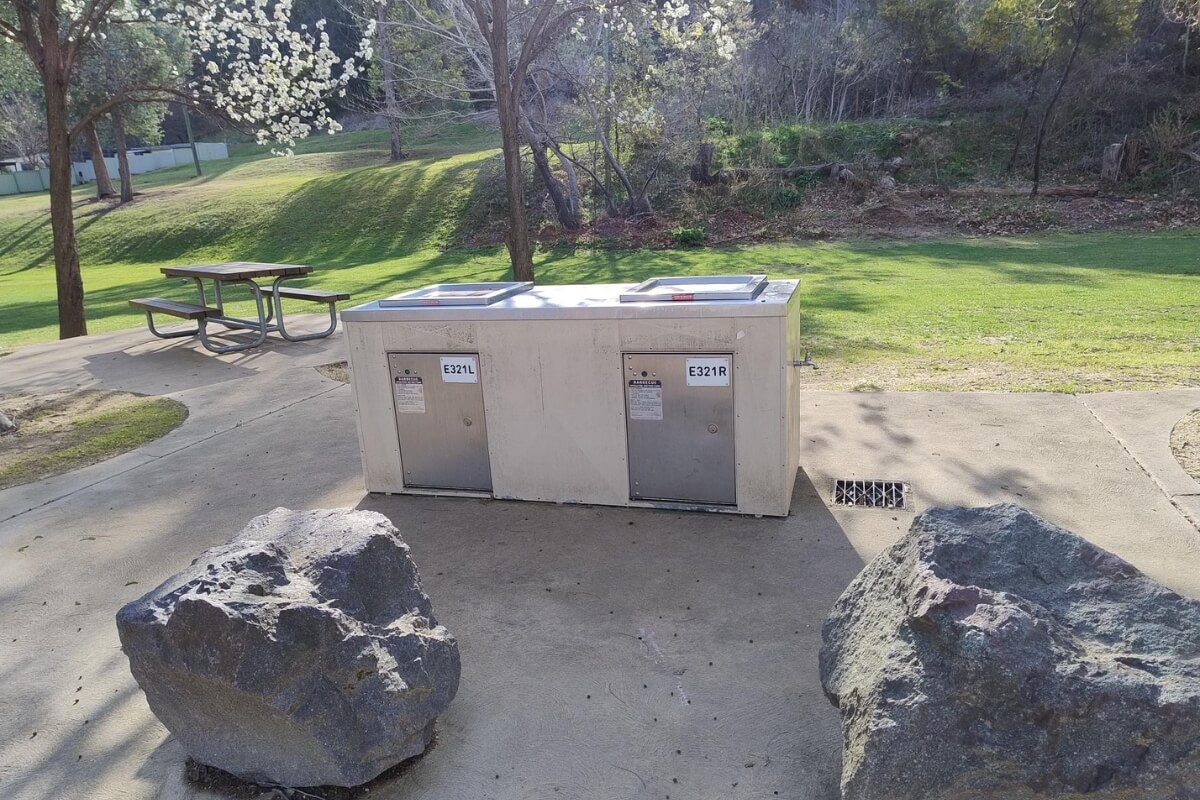
“Barbie” is the affectionate Aussie term for a barbecue.
Whether it’s a weekend gathering or a casual weeknight dinner, throwing something on the barbie is an essential part of Australian culture.
Examples in sentences:
- “We’re having a barbie at our place this weekend.”
- “Throw some snags on the barbie, would ya?”
- “Nothing beats a summer arvo with a barbie and a cold one.”
- “They invited us over for a barbie by the beach.”
- “The barbie’s fired up and ready to go!”
Bathers
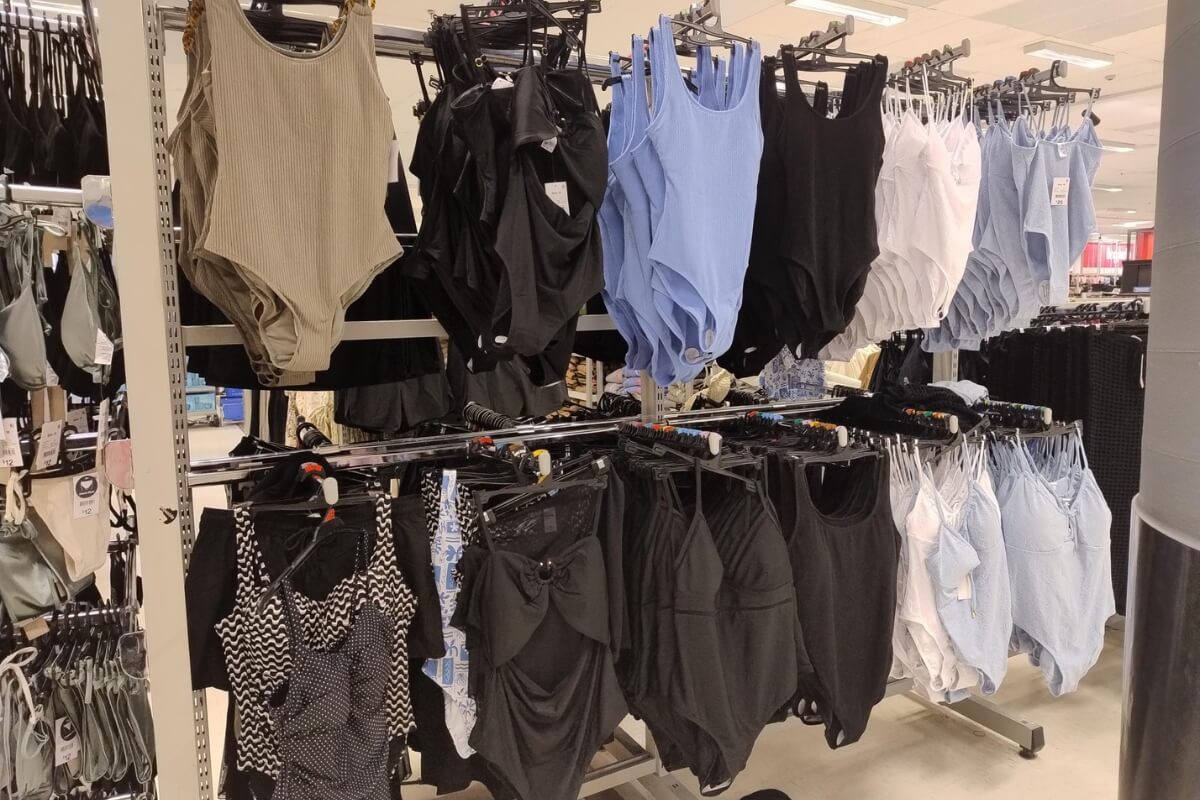
In Australia, your “bathers” are your swimsuit.
Whether you’re hitting the beach or the pool, don’t forget to pack your bathers!
Examples in sentences:
- “Grab your bathers, we’re heading to the beach!”
- “She bought new bathers for the summer.”
- “Don’t forget to rinse out your bathers after a swim.”
- “I left my bathers hanging on the line.”
- “It’s a perfect day to put on your bathers and dive in.”
Beauty
“Beauty” is an Aussie exclamation that expresses approval or excitement, often used when something turns out well or is particularly pleasing.
Examples in sentences:
- “You got tickets to the game? Beauty!”
- “The weather’s looking good for the weekend—beauty!”
- “That’s a beauty of a catch, mate!”
- “Finished the job early? Beauty!”
- “Beauty, I just found my keys.”
Berko
“Berko” is Aussie slang used to describe someone who has gone wild or lost their temper. It can be used to express anger, frustration, or just going a bit over the top.
Examples in sentences:
- “He went berko when he found out about the mistake.”
- “The crowd went absolutely berko after the winning goal.”
- “She went berko when the dog ruined the garden.”
- “Don’t make him go berko by bringing that up again.”
- “The kids went berko when they saw the surprise.”
Bevvy
“Bevvy” is Australian slang for a beverage, often used when referring to a casual drink, particularly alcoholic ones like beer or wine.
Examples in sentences:
- “Let’s grab a bevvy after work.”
- “It’s the perfect day for a cold bevvy at the beach.”
- “I could use a bevvy right about now.”
- “They’re meeting at the pub for a few bevvies.”
- “Cracking open a bevvy after a long day is the best.”
Big Smoke
“Big Smoke” is Aussie slang for a large city, usually referring to places like Sydney or Melbourne. It’s often used by people living in rural or regional areas to describe city life and the urban environment.
Examples in sentences:
- “I’m heading to the Big Smoke for the weekend.”
- “After living in the country, the Big Smoke can feel overwhelming.”
- “They moved from the Big Smoke to a quiet town on the coast.”
- “You can find all sorts of opportunities in the Big Smoke.”
- “The Big Smoke’s fast pace isn’t for everyone.”
Bikie
“Bikie” is Australian slang for a member of a motorcycle gang or group. It often has connotations of outlaw culture or organized crime, although not all bikies are involved in illegal activities.
Examples in sentences:
- “The police arrested a group of bikies after the brawl.”
- “He’s been a bikie for most of his life, riding with the same crew.”
- “There was a bikie gang causing trouble down by the pub.”
- “Bikies are known for their loyalty and camaraderie within the group.”
- “She joined a bikie gang after years of riding solo.”
Bikkie
“Bikkie” is the Aussie term for a biscuit (cookie), but it’s also used in phrases like “big bikkies” to refer to something costly or expensive.
Examples in sentences:
- “I’m having a cuppa and a bikkie.”
- “That new car cost him big bikkies!”
- “She always keeps a tin of bikkies for guests.”
- “Can you pass me a bikkie, please?”
- “These bikkies are homemade and delicious.”
Billabong
A “billabong” is a waterhole or pond that forms in the bend of a river, often in dry areas where the river doesn’t flow year-round. It’s a quintessential feature of the Australian outback.
Examples in sentences:
- “They set up camp by the billabong.”
- “The cattle gathered around the billabong to drink.”
- “The billabong was still, reflecting the sky above.”
- “We cooled off in the billabong during the heat of the day.”
- “The billabong dried up completely during the drought.”
Billy
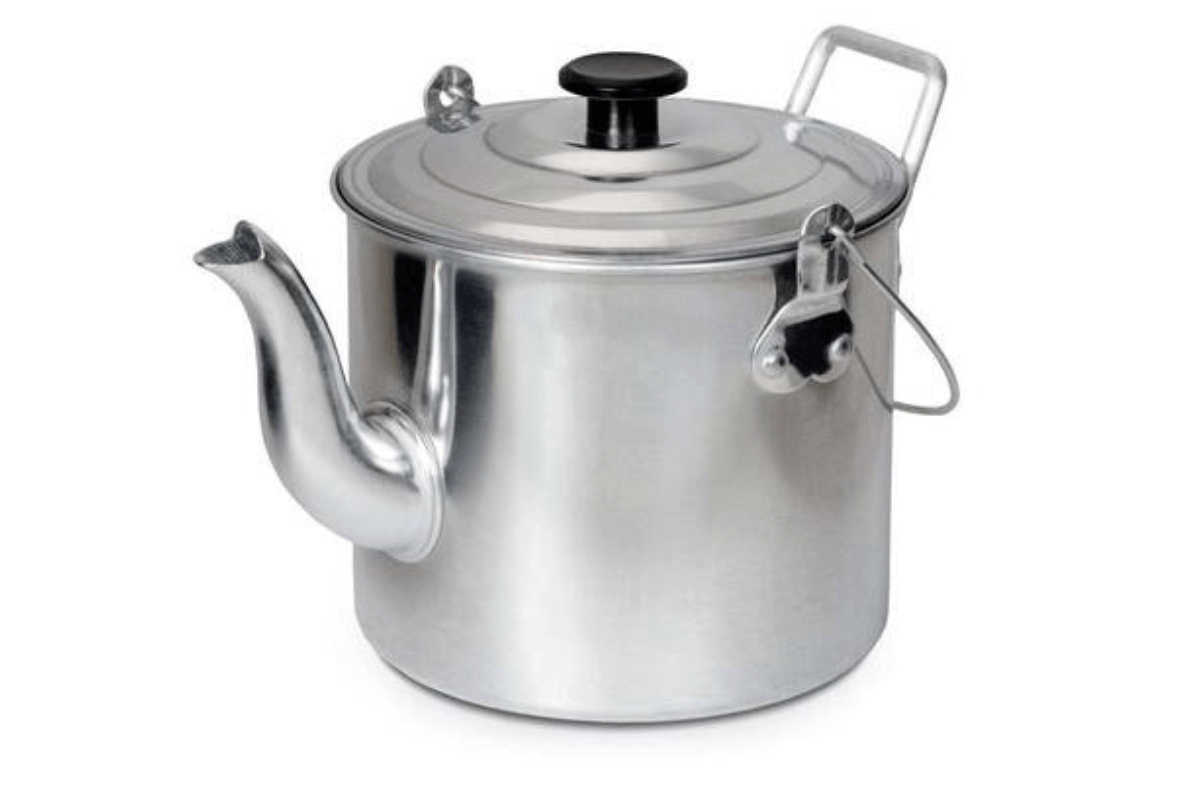
A “billy” is a tin or metal container used to boil water over a campfire, often for making tea in the great outdoors.
It’s an essential piece of gear for any Aussie camper.
Examples in sentences:
- “We boiled the billy for a cuppa after setting up camp.”
- “The billy was always on the fire, ready for a brew.”
- “He taught us how to swing the billy without spilling.”
- “Nothing beats a billy tea under the stars.”
- “The billy clanged as we packed it into the ute.”
Bin Chicken
“Bin Chicken” is a nickname Australians have given to the White Ibis, a bird that has adapted to city life and is often spotted scavenging in bins for food.
Once considered a majestic bird, it’s now mostly associated with its scavenging habits in urban areas.
Examples in sentences:
- “There’s a bin chicken going through the trash outside.”
- “You can’t go to the park without seeing a few bin chickens.”
- “The bin chicken has become an unofficial mascot of the city.”
- “Look at that bin chicken stealing food from the picnic table!”
- “Bin chickens are everywhere these days, especially near rubbish bins.”
Blinkers
“Blinkers” is a term used in Australia to describe the indicators or turn signals on a vehicle. It refers to the blinking light that signals a change of direction. The term is also used figuratively to describe someone with a narrow or limited perspective, similar to how horses wear blinkers to restrict their vision.
Examples in sentences:
- “Don’t forget to use your blinkers when turning.”
- “The car ahead didn’t bother using its blinkers.”
- “I think your blinkers are broken.”
- “He’s got blinkers on when it comes to understanding other opinions.”
- “The horse had blinkers on to help it focus during the race.”
Bloke
A “bloke” is an informal Australian term for a man. It’s used to refer to any ordinary, everyday guy, often with a sense of camaraderie or friendliness.
Examples in sentences:
- “He’s a good bloke, always ready to help.”
- “I met this bloke at the pub last night.”
- “That bloke over there looks familiar.”
- “Every bloke in town knows him.”
- “He’s just an ordinary bloke with a big heart.”
Bloody
“Bloody” is a versatile Australian adjective used to intensify a statement, much like “very” or “really.” It’s a classic Aussie expletive that’s used in a variety of situations.
Examples in sentences:
- “It’s bloody hot today!”
- “That was a bloody good meal.”
- “He’s a bloody legend, that one.”
- “This car’s bloody fast!”
- “It’s a bloody miracle we made it on time.”
Bloody Oath
“Bloody Oath” is a classic Australian phrase used to strongly agree with someone or something. It’s a way of saying “absolutely” or “you bet,” and it adds a bit of emphasis to the agreement.
Examples in sentences:
- “Are you coming to the barbie this weekend?” – “Bloody oath, I am!”
- “That was a great game!” – “Bloody oath it was!”
- “Do you reckon it’s hot today?” – “Bloody oath, it’s scorching.”
- “You think we’ll win the match?” – “Bloody oath we will!”
- “That steak was perfect!” – “Bloody oath it was delicious.”
Blowie
“Blowie” is a colloquial term for a blowfly, one of the most common and annoying insects in Australia. These flies are notorious for buzzing around, especially in hot weather, and can be a real nuisance during outdoor activities.
Examples in sentences:
- “I can’t enjoy my lunch with all these blowies around.”
- “There’s a blowie buzzing around the kitchen again.”
- “We need to close the door before more blowies get in.”
- “Blowies always show up when you’re trying to have a barbie.”
- “Swatting away blowies is just part of summer here.”
Bludger
“Bludger” is a well-known Aussie slang term used to describe someone who is lazy and avoids hard work, often relying on others to do the job for them. It’s commonly used in a humorous or critical way.
Examples in sentences:
- “He’s such a bludger, always finding excuses to avoid helping.”
- “That bloke is a real bludger, never does a fair day’s work.”
- “Stop being a bludger and give me a hand with this!”
- “They called him a bludger for sitting around while everyone else worked.”
- “You won’t get anywhere being a bludger all your life.”
Bogan
A “bogan” is an Australian slang term that describes someone who is perceived as unsophisticated, often due to their manner of speech, dress, or behavior. The term is sometimes used humorously, but it can also be derogatory.
Examples in sentences:
- “He’s a bit of a bogan, but he’s a good bloke.”
- “You can spot a bogan by their flannie and mullet.”
- “The bogans were out in force at the footy match.”
- “She calls herself a bogan and proud of it.”
- “Don’t be such a bogan, mate.”
Bonza
“Bonza” is a classic Australian slang term used to express that something is excellent or fantastic. It’s an enthusiastic way of showing approval or excitement about something good.
Examples in sentences:
- “That was a bonza day at the beach!”
- “This steak is absolutely bonza!”
- “The weather today is bonza, perfect for a barbecue.”
- “He did a bonza job on the renovations.”
- “We had a bonza time at the concert last night.”
Bottle-o
“Bottle-o” is a popular Aussie term for a liquor store, where you can buy alcoholic beverages. It’s a casual and commonly used phrase across Australia.
Examples in sentences:
- “I’m heading to the bottle-o to grab some beers.”
- “We need to stop by the bottle-o before the party.”
- “The bottle-o down the road has great deals on wine.”
- “He picked up a bottle of whiskey from the bottle-o.”
- “The bottle-o closes at 10 PM, so we better hurry.”
Brekky
“Brekky” is the Australian way of saying breakfast. Whether you’re grabbing something quick on the go or enjoying a leisurely morning meal, brekky is an essential part of the day.
Examples in sentences:
- “What are you having for brekky?”
- “We had a big brekky before heading out.”
- “Brekky is the most important meal of the day.”
- “I’m too busy for brekky this morning.”
- “They serve all-day brekky at the café.”
Brolly
“Brolly” is a playful Australian term for an umbrella. It’s a handy word to know, especially when those sudden rain showers pop up!
Examples in sentences:
- “Don’t forget your brolly, it looks like rain.”
- “She opened her brolly just as the rain started.”
- “I left my brolly on the bus.”
- “A good brolly is a must-have during the wet season.”
- “He was soaked because he didn’t bring a brolly.”
Budgie Smugglers
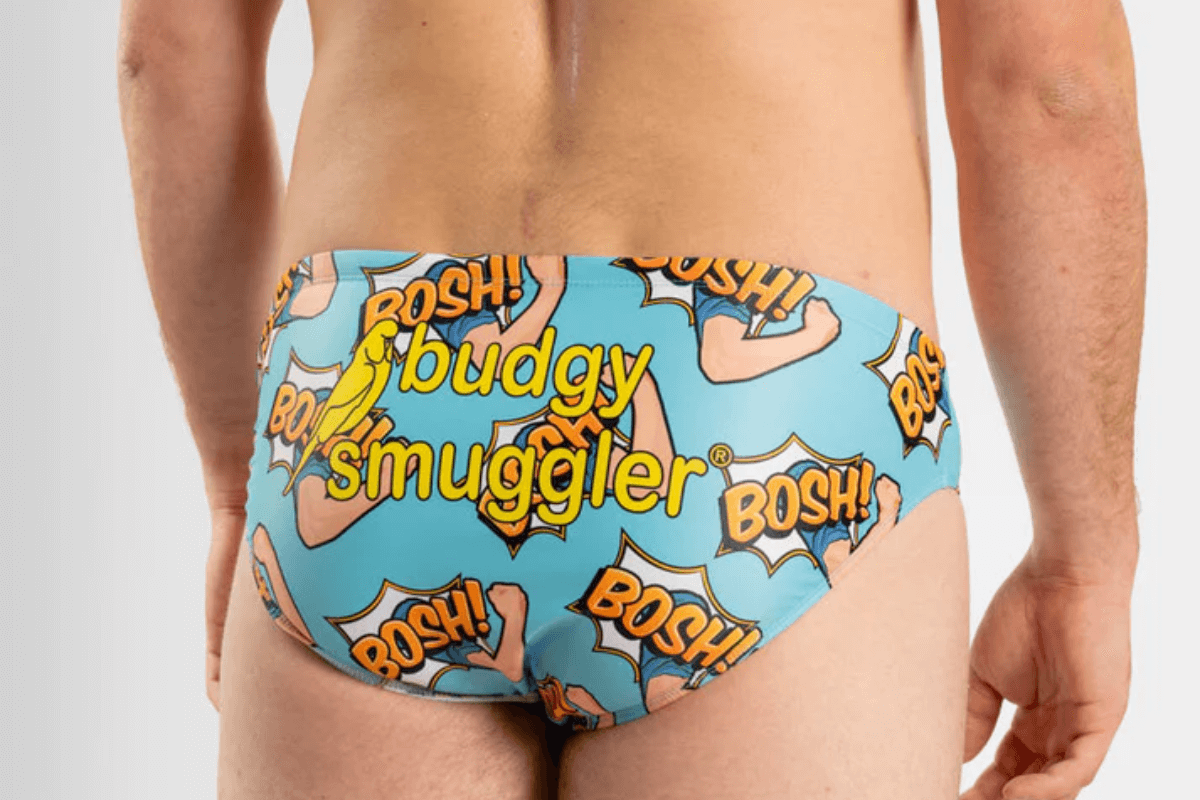
“Budgie smugglers” is the humorous Australian term for tight-fitting men’s swimwear, particularly Speedos.
The name comes from the idea that the snug fit might suggest you’re smuggling a small bird, like a budgie, in there!
Examples in sentences:
- “He rocked up to the beach in his budgie smugglers.”
- “Wearing budgie smugglers takes confidence!”
- “Budgie smugglers are a classic Aussie look.”
- “He’s not afraid to show off in his budgie smugglers.”
- “The surf lifesavers are often seen in their budgie smugglers.”
BYO
“BYO” stands for “Bring Your Own” and is commonly used to indicate that guests should bring their own alcohol, food, or other supplies to an event.
Sometimes a restaurant or cafe won’t have an alcohol license, so it’ll be a BYO place where you can take your own alcohol.
It’s often seen on party invitations and at casual gatherings, allowing people to contribute to the festivities.
Examples in sentences:
- “Don’t forget it’s a BYO event, so bring your own drinks.”
- “The party’s BYO, so I’ll grab a six-pack on the way.”
- “The restaurant doesn’t have an alcohol license, so it’s BYO”
- “It’s a BBQ at their place, but it’s BYO food and drinks.”
- “We’re having a picnic this weekend, BYO everything.”
- “The wedding reception is BYO, which keeps things casual.”
Australian slang terms starting with C
Carked It
“Carked it” is a colorful Australian slang expression meaning that something has died, stopped working, or completely broken down. It’s often used in a humorous or lighthearted way.
Examples in sentences:
- “My car carked it on the way to work.”
- “The TV carked it right before the game started.”
- “Poor old Bruce, his cat carked it last week.”
- “I think my phone just carked it; it won’t turn on.”
- “The fridge carked it, so all the food went bad.”
Chalky
“Chalky” is an Australian slang term used to describe a teacher, especially from the days when blackboards and chalk were commonly used in classrooms. It’s a casual and sometimes affectionate way to refer to an educator.
Examples in sentences:
- “Old chalky gave us extra homework today.”
- “The students really like their new chalky, she’s pretty cool.”
- “Chalky was always writing equations on the board.”
- “I ran into my old chalky at the grocery store yesterday.”
- “Being a chalky isn’t easy, but it’s rewarding.”
Chewy
“Chewy” is a casual Australian term for chewing gum. It’s commonly used when someone is asking for or offering a piece of gum.
Examples in sentences:
- “Do you have any chewy? I need something to freshen up.”
- “He’s always got a piece of chewy in his mouth.”
- “Can I grab a chewy from you?”
- “She popped a piece of chewy before her meeting.”
- “Don’t stick your chewy under the desk!”
Choc A Bloc
“Choc A Bloc” is an Australian phrase used to describe something that is completely full or packed to the brim. It can refer to anything from a busy street to a full container.
Examples in sentences:
- “The parking lot was choc a bloc with cars.”
- “Her schedule is choc a bloc with meetings.”
- “The fridge is choc a bloc with leftovers.”
- “The event was choc a bloc with people.”
- “His bag was choc a bloc with clothes for the trip.”
Chook
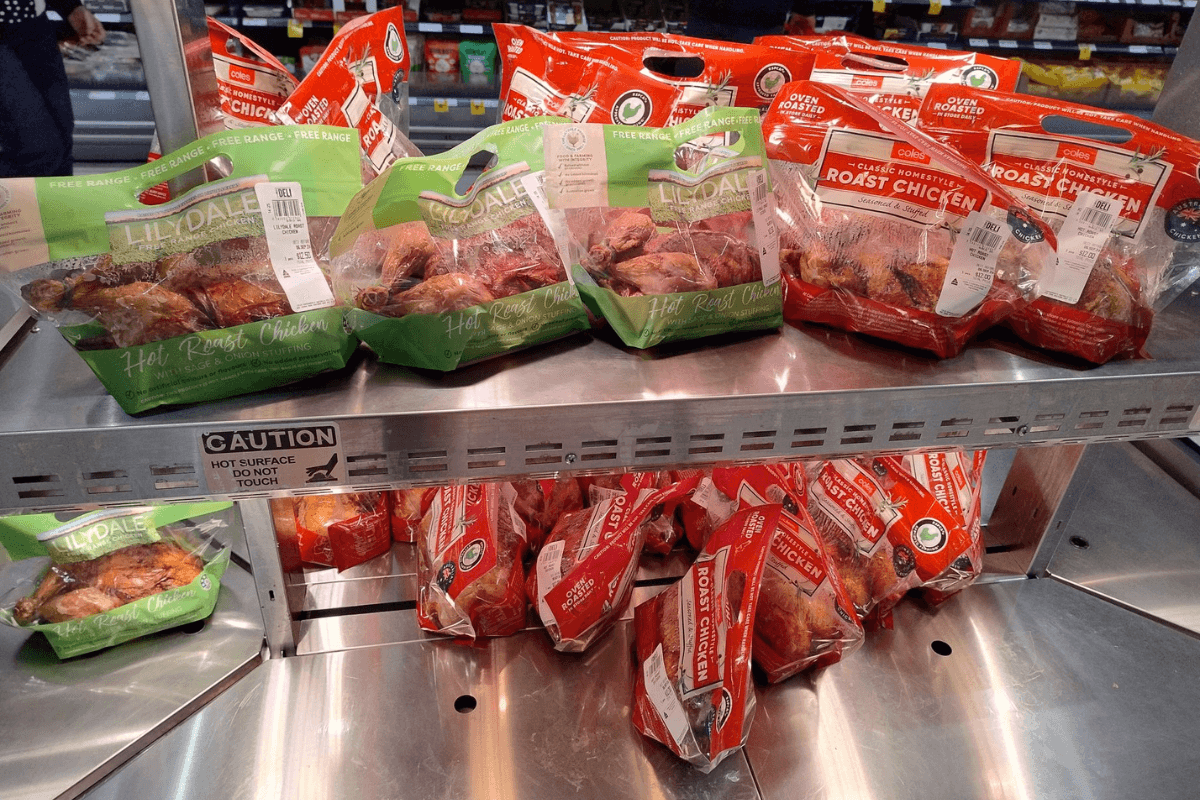
“Chook” is a common Aussie term for a chicken.
Whether it’s a pet, a farm animal, or served up on a plate, “chook” is the go-to word for chickens in Australia.
You might have some chooks in your backyard or you might be going to Coles to get a roasted chook in a bag.
Examples in sentences:
- “We’ve got a couple of chooks in the backyard.”
- “I’ll roast a chook for dinner tonight.”
- “The chooks are laying eggs every morning.”
- “She bought a fresh chook from the market.”
- “Keep an eye on the chooks, they like to wander off.”
Chrissie
“Chrissie” is the Australian slang for Christmas. It’s a casual and affectionate way to refer to the holiday, often used when talking about festive activities or decorations.
Examples in sentences:
- “What are your plans for Chrissie this year?”
- “They decorated the house for Chrissie.”
- “We’re having a big Chrissie lunch with the family.”
- “Chrissie is my favorite time of year.”
- “They exchanged Chrissie gifts by the tree.”
Cobber
“Cobber” is an old-fashioned Australian term for a close friend or mate. It’s less commonly used these days but still recognized as a term of endearment and camaraderie.
Examples in sentences:
- “G’day cobber, how’s it going?”
- “He’s been my cobber since school.”
- “You can always rely on a good cobber.”
- “He introduced me to his cobber from work.”
- “Thanks, cobber, I owe you one.”
Coldie
“Coldie” is a term Australians use to refer to a cold beer. It’s a casual way to invite someone to have a drink, especially after a long day or in hot weather.
Examples in sentences:
- “Let’s grab a coldie after work.”
- “He handed me a coldie straight from the esky.”
- “A coldie on a hot day is the best.”
- “We enjoyed a couple of coldies by the beach.”
- “He cracked open a coldie as soon as he got home.”
Coppers
“Coppers” is an Australian slang term for police officers. It’s a casual and somewhat affectionate term that’s commonly used in everyday conversation.
Examples in sentences:
- “The coppers showed up to break up the party.”
- “I saw the coppers patrolling the streets.”
- “The coppers were quick to respond to the call.”
- “He’s always had a good relationship with the local coppers.”
- “The coppers gave him a warning.”
Crikey
“Crikey” is a classic Australian exclamation used to express surprise or amazement. It’s often associated with the late Steve Irwin, who popularized the term worldwide.
Examples in sentences:
- “Crikey, that was a close call!”
- “Crikey, look at the size of that croc!”
- “Crikey, I didn’t see that coming.”
- “Crikey, it’s already 5 o’clock!”
- “Crikey, what a surprise to see you here!”
Crook

“Crook” can mean two things in Australian slang: feeling unwell or being a criminal. The context usually makes it clear which meaning is intended.
Examples in sentences:
- “I’m feeling a bit crook today.”
- “He’s been crook with the flu all week.”
- “That bloke’s a crook, don’t trust him.”
- “She had to call in sick because she was crook.”
- “The police caught the crook red-handed.”
Australian slang terms starting with D
Dag
“Dag” is often used affectionately in Australia to describe someone who may be a bit uncool, but in a lovable way. It can also refer to the wool on a sheep that gets dirty and matted.
Examples in sentences:
- “He’s such a dag, but we all love him.”
- “You’re being a bit of a dag with that outfit.”
- “She’s a dag, always cracking silly jokes.”
- “Don’t be a dag, come out with us!”
- “You can be a dag and still have fun.”
Daggy
“Daggy” is used to describe something or someone that is out of style or not trendy. It’s often used humorously and not meant to be taken too seriously.
Examples in sentences:
- “That’s a pretty daggy jumper you’re wearing.”
- “His taste in music is a bit daggy.”
- “She loves her daggy old car.”
- “These daggy shoes have been through a lot.”
- “I know it’s daggy, but I love it.”
Daks
“Daks” is an Australian slang term for trousers or pants. It’s often used in casual conversation, especially when referring to someone’s clothing.
Examples in sentences:
- “Where are my daks? I can’t find them anywhere.”
- “He was caught with his daks down.”
- “Those are some stylish daks you’ve got on.”
- “I need to buy new daks for work.”
- “He tore his daks while climbing the fence.”
Damper
“Damper” is a type of simple Australian bread, traditionally made from flour, water, and sometimes milk, then baked in the coals of a campfire. It’s an iconic bush food, often associated with stockmen, drovers, and early Australian settlers.
Examples in sentences:
- “We made some damper on the campfire last night—it was delicious with butter.”
- “Damper is a staple when you’re camping out in the bush.”
- “The drovers used to bake damper as their main source of bread.”
- “Nothing beats the smell of fresh damper cooked over an open fire.”
- “He showed me how to make damper, a true taste of the Australian outback.”
Defo
“Defo” is a shortened form of “definitely,” commonly used in Australian slang to confirm something with certainty.
Examples in sentences:
- “I’m defo going to the party on Friday.”
- “That movie was defo worth watching.”
- “She’s defo the best player on the team.”
- “We’re defo planning a trip to the coast this summer.”
- “He’s defo going to ace that exam.”
Devo
“Devo” is short for devastated and is commonly used in Australian slang to express extreme disappointment or sadness about something.
Examples in sentences:
- “I was devo when I missed out on tickets to the concert.”
- “She was devo after losing the match in the final minute.”
- “He was absolutely devo when his car broke down.”
- “I’m devo about the cancelled holiday plans.”
- “They were all devo when the event got rained out.”
Digger
“Digger” is a term that originated during World War I, referring to Australian soldiers. The name comes from the trench-digging duties that were a major part of their lives. Today, it represents the values of bravery, camaraderie, and resilience that are associated with the Australian spirit.
Examples in sentences:
- “My grandfather was a proud digger who served in Gallipoli.”
- “The Anzac parade was full of old diggers marching in unison.”
- “He wore his digger hat with pride, remembering his days in the army.”
- “The diggers were known for their bravery and mateship during the war.”
- “Many diggers returned home to Australia as heroes after the war.”
Doona
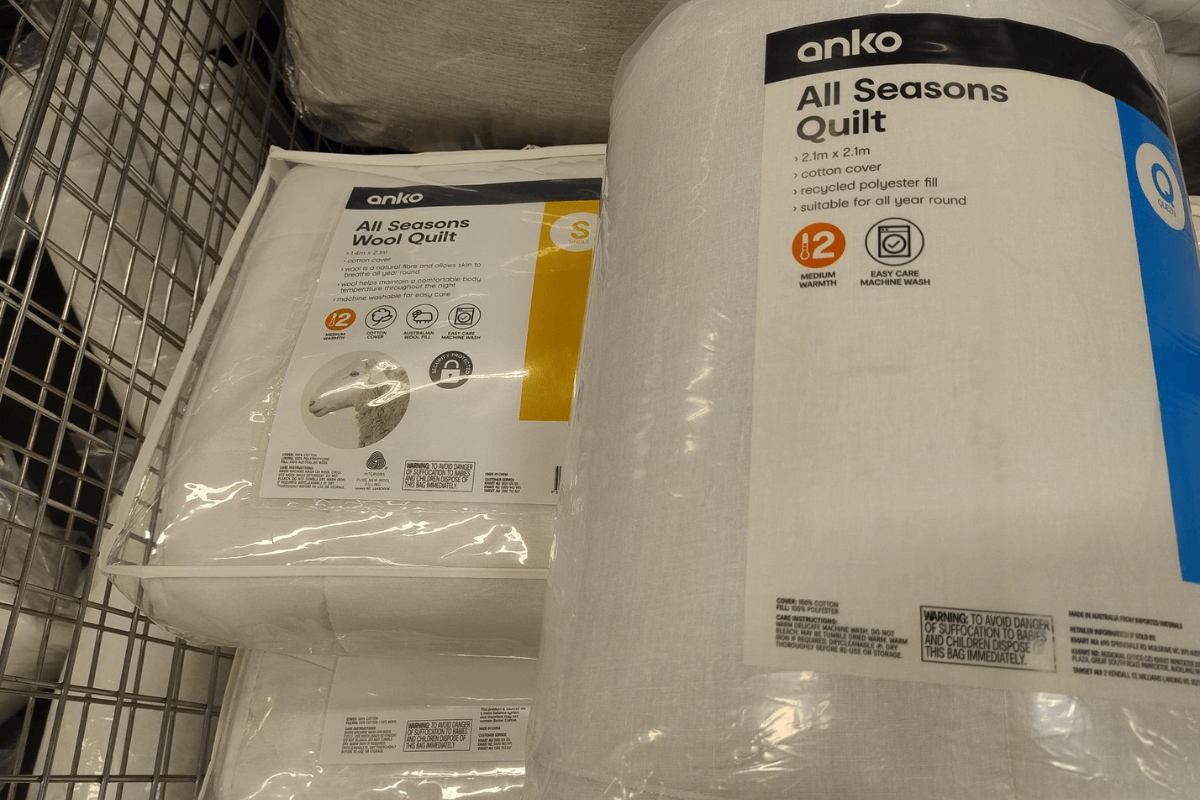
“Doona” is an Australian term for a thick quilt or duvet, often filled with down or synthetic fibers, used as a bed covering to keep warm.
It’s a common item in most Australian households, especially during the colder months.
Examples in sentences:
- “I don’t want to get out of bed, it’s so cozy under the doona.”
- “Grab the doona, it’s going to be a cold night.”
- “She snuggled up under the doona to watch a movie.”
- “I bought a new doona for the winter months.”
- “He prefers sleeping with a light blanket, but I need my doona.”
Drongo
“Drongo” is an Australian slang term used to describe someone who isn’t very smart or who makes foolish decisions. It’s often used in a light-hearted or teasing manner, though it can also be derogatory depending on the context.
Examples in sentences:
- “Don’t be a drongo, mate, use your head.”
- “He’s such a drongo, always messing things up.”
- “Only a drongo would forget their own birthday.”
- “Stop acting like a drongo and think before you speak.”
- “That drongo just ran a red light.”
Dunny
“Dunny” is a quintessentially Australian term for a toilet. It’s often used to refer to an outdoor or public toilet, but can be used for any bathroom. The word has a long history in Australia and is still commonly used today.
Examples in sentences:
- “I need to find a dunny, quick!”
- “The dunny out the back needs fixing.”
- “They’ve just installed a new dunny at the park.”
- “Don’t forget to flush the dunny.”
- “He’s in the dunny, won’t be long.”
Australian slang terms starting with E
Ekka
“Ekka” is short for the “Exhibition,” which is the Royal Queensland Show, a popular annual event in Brisbane. It features agricultural displays, carnival rides, food stalls, and entertainment, drawing crowds from all over the state.
Examples in sentences:
- “We’re heading to the Ekka this weekend for some showbags.”
- “The Ekka is a great place to see farm animals up close.”
- “She won first prize for her jam at the Ekka.”
- “The Ekka is a family tradition for us every year.”
- “Kids love the rides and the atmosphere at the Ekka.”
Esky
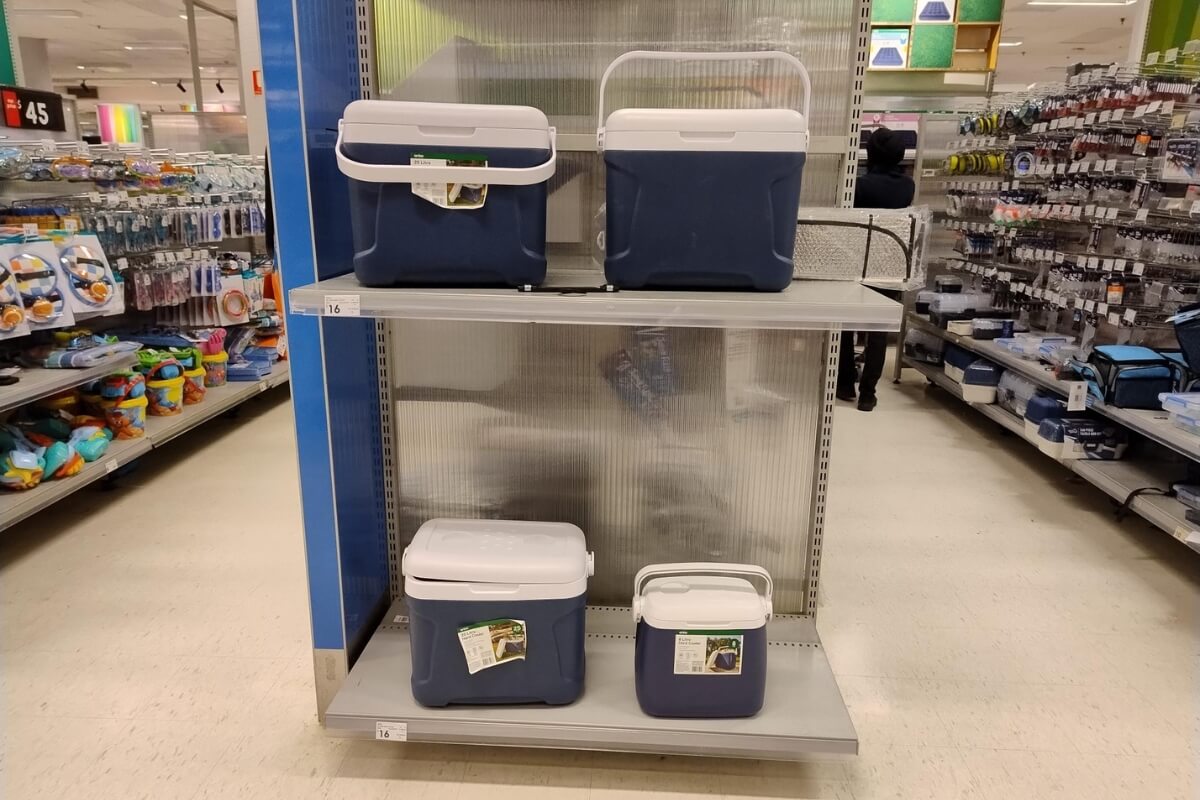
“Esky” is the Australian term for a portable cooler, used to keep drinks and food cold, especially during outdoor activities like barbecues, picnics, or beach trips. It’s an essential item for any Aussie gathering.
Examples in sentences:
- “Don’t forget to pack the esky with cold drinks.”
- “The esky is full of ice and ready for the beach.”
- “We always bring an esky to the footy matches.”
- “The esky kept the beers cold all day long.”
- “Everyone chipped in to fill the esky with snacks.”
Exy
“Exy” is short for “expensive.” It’s used to describe something that costs a lot of money, whether it’s an item, a service, or an experience. Aussies often use this term when something is considered overpriced.
Examples in sentences:
- “That new phone is a bit exy, don’t you think?”
- “The tickets to the concert were pretty exy.”
- “She bought an exy dress for the wedding.”
- “It’s a nice restaurant, but it’s quite exy.”
- “We found a cheaper alternative because the first option was too exy.”
Australian slang terms starting with F
Facey
“Facey” is an Australian slang term used to refer to Facebook. It’s a casual abbreviation often used in conversation when talking about the social media platform.
Examples in sentences:
- “I saw the event invite on Facey.”
- “Send me the details on Facey, and I’ll check it out.”
- “He spends way too much time scrolling through Facey.”
- “I haven’t been on Facey much these days.”
- “She posted all her holiday pics on Facey.”
Fair Dinkum
“Fair dinkum” is an iconic Australian expression meaning that something is genuine or true. It’s often used to emphasize honesty or authenticity, and can also be used as a question to express disbelief or surprise.
Examples in sentences:
- “He’s a fair dinkum bloke, always tells it like it is.”
- “Is that fair dinkum? I can’t believe it!”
- “This offer is fair dinkum, no tricks involved.”
- “She gave me a fair dinkum promise that she’d be there.”
- “The story was so wild, I had to ask if it was fair dinkum.”
Fairy Bread
“Fairy bread” is a classic Australian treat often served at children’s parties. It consists of white bread spread with butter and covered with colorful sprinkles (known as “hundreds and thousands”). Simple but loved by kids all over Australia.
Examples in sentences:
- “The kids were excited to see plates of fairy bread at the party.”
- “Fairy bread was always my favorite treat growing up.”
- “We made a huge batch of fairy bread for the school fair.”
- “No Aussie birthday party is complete without fairy bread.”
- “She learned to make fairy bread for her niece’s party.”
Fairy Floss
“Fairy Floss” is the Australian term for what’s known as cotton candy in other parts of the world. It’s a popular treat at fairs, carnivals, and amusement parks, spun from sugar to create fluffy, melt-in-your-mouth sweetness.
Examples in sentences:
- “The kids love getting fairy floss at the show.”
- “Nothing says carnival like a big stick of fairy floss.”
- “She came back with pink fairy floss all over her face.”
- “The fairy floss machine was working non-stop at the fair.”
- “I haven’t had fairy floss since I was a kid!”
Far out
“Far out” is an Aussie phrase often used to express surprise or astonishment. It’s a versatile term that can be used in both positive and negative contexts, depending on the tone and situation.
Examples in sentences:
- “Far out, I can’t believe you did that!”
- “Did you see that? Far out, that was amazing!”
- “Far out, this weather is insane.”
- “Far out, how did you manage to pull that off?”
- “Far out, I didn’t see that coming.”
Footy
“Footy” is the colloquial term for either Australian Rules Football (AFL) or Rugby, depending on the region. It’s a beloved sport in Australia, with passionate fans and a significant part of the country’s culture.
Examples in sentences:
- “We’re heading to the footy match this Saturday.”
- “Footy season is the best time of the year!”
- “He’s been playing footy since he was a kid.”
- “Let’s watch the footy at the pub.”
- “Footy brings the whole community together.”
Frothy
“Frothy” is a lighthearted term for a beer, particularly one with a good head of foam. It’s often used when catching up with friends at a pub or enjoying a relaxing drink at home.
Examples in sentences:
- “Let’s grab a couple of frothies after work.”
- “Nothing like a cold frothy on a hot day.”
- “He ordered a frothy and settled in for the game.”
- “They’re serving some great frothies at the bar.”
- “He cracked open a frothy and kicked back on the couch.”
Flat Out
“Flat out” is an expression used to describe being extremely busy or operating at full capacity. It can also be used to describe someone or something moving at top speed.
Examples in sentences:
- “I’ve been flat out at work all week.”
- “The team is working flat out to meet the deadline.”
- “He was driving flat out to make it on time.”
- “She’s been flat out with school assignments.”
- “The shop has been flat out since the sale started.”
Australian slang terms starting with G
G’day
“G’day” or “Gidday” is a quintessential Australian greeting that’s a friendly way to say hello.
It’s used at any time of the day and is one of the most recognizable aspects of Australian English.
Examples in sentences:
- “G’day, mate! How’s it going?”
- “I saw him this morning and gave him a big g’day.”
- “She greeted everyone with a cheerful g’day.”
- “G’day! Welcome to Australia.”
- “The locals all say g’day when you walk by.”
Galah
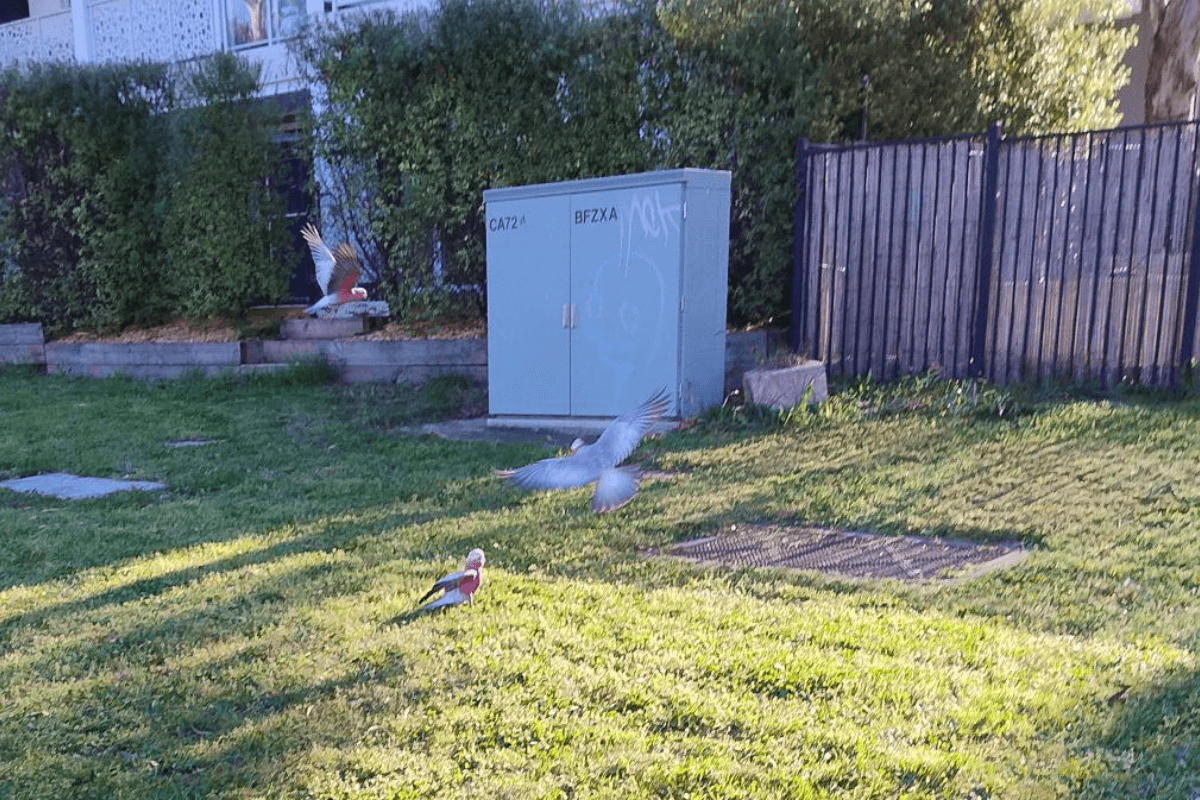
In Australian slang, a “Galah” refers to someone acting foolishly or behaving in a silly manner.
In the TV show “Home and Away” the character “Alf Stewart” was known for calling people a “flaming galah”
It’s also the name of a pink and grey cockatoo commonly found in Australia, known for its loud screeching.
Examples in sentences:
- “Stop being such a galah and get serious.”
- “He was acting like a real galah at the party.”
- “Don’t mind him, he’s just a bit of a galah.”
- “That galah was making a racket in the tree.”
- “He’s a harmless galah, always up to some mischief.”
Garbo
“Garbo” is Australian slang for a garbage collector. It’s a casual, shortened term used to refer to someone whose job it is to collect and dispose of rubbish.
Examples in sentences:
- “The garbo comes every Tuesday morning.”
- “I heard the garbo truck outside, better take the bin out!”
- “The garbos work hard, even on public holidays.”
- “He’s been a garbo for years and loves his job.”
- “The kids always wave to the garbo when he drives by.”
Gnarly
“Gnarly” is an Australian slang term that originated from surfing culture. It describes something that is impressive, cool, or intense, and can be used positively or negatively depending on the context.
Examples in sentences:
- “That was a gnarly wave you just caught!”
- “The hike was pretty gnarly, but totally worth it.”
- “He showed me some gnarly tricks on his skateboard.”
- “That storm last night was gnarly.”
- “The concert was gnarly, the band really rocked.”
Going off
“Going off” refers to a situation or event that is full of energy, excitement, or activity. It’s often used to describe parties, events, or any scenario where things are lively.
Examples in sentences:
- “The party was going off last night!”
- “This concert is going off, the crowd is loving it.”
- “The fireworks were really going off on New Year’s Eve.”
- “The club is going off tonight, it’s packed.”
- “The festival is going off, so much to see and do.”
Good On Ya
“Good on ya” is a common Australian expression used to congratulate someone or to express approval. It’s a way to acknowledge someone’s effort or success.
Examples in sentences:
- “You got the job? Good on ya, mate!”
- “Good on ya for finishing the race.”
- “He helped out with the charity, good on him.”
- “You’ve done a great job, good on ya.”
- “Good on ya for sticking with it.”
Goon
“Goon” is Australian slang for inexpensive cask wine. It’s popular among students and those looking for a budget-friendly way to enjoy alcohol. Goon is often associated with social gatherings and informal parties.
Examples in sentences:
- “We grabbed a box of goon for the weekend.”
- “Goon is a student’s best friend on a budget.”
- “The goon bag is a staple at Aussie parties.”
- “They were playing drinking games with goon.”
- “A glass of goon isn’t exactly fine wine, but it does the trick.”
Granny Smith
The $100 note in Australia is colloquially known as a “Granny Smith” because of its green color, resembling the iconic green apple. It’s a playful reference to the note’s hue and one of the most recognized apple varieties in the country.
- “He pulled a Granny Smith out of his wallet to pay for the tickets.”
- “You don’t see many Granny Smiths in everyday transactions.”
- “She handed over a Granny Smith for the new TV.”
- “Winning that bet got me a couple of Granny Smiths.”
- “He keeps a Granny Smith stashed in the back of his drawer for emergencies.”
Grazier
A “Grazier” is a term used to describe a farmer who specializes in raising grazing animals like sheep or cattle. These farmers often operate on large, expansive properties in rural Australia.
Examples in sentences:
- “He’s a third-generation grazier with a huge cattle station.”
- “The grazier took pride in his herd of sheep.”
- “Being a grazier in Australia means dealing with tough conditions.”
- “Many graziers work tirelessly to maintain their land.”
- “The drought has been hard on the local graziers.”
Grease Monkey
“Grease Monkey” is a colloquial Australian term used to describe a mechanic, someone who gets their hands dirty working with engines, cars, or machinery. It’s a light-hearted nickname that reflects the hands-on, often messy nature of the job.
Examples in sentences:
- “I need to take my car to the grease monkey for a tune-up.”
- “The grease monkeys at the garage did a great job fixing the engine.”
- “My uncle has been a grease monkey for over 20 years.”
- “He loves working as a grease monkey; cars are his passion.”
- “I had to call a grease monkey when my car broke down on the highway.”
Green Horse
A “Green Horse” refers to a horse that is inexperienced, untrained, or still in the early stages of its training. It’s a common term in the horse-riding community.
Examples in sentences:
- “She’s been working on breaking in a green horse.”
- “Riding a green horse requires patience and skill.”
- “The green horse was skittish around new things.”
- “Training a green horse can be challenging but rewarding.”
- “They bought a green horse to train for competitions.”
Grog
“Grog” is a common Australian slang term used to refer to alcohol, whether it’s beer, wine, or spirits. It’s often used when talking about drinking socially or at a gathering.
Examples in sentences:
- “He’s always got a stash of grog for the weekend.”
- “We had a few too many grogs last night.”
- “Bring some grog to the BBQ, will ya?”
- “There wasn’t enough grog at the party to go around.”
- “They stocked up on grog for the big footy game.”
Grub
“Grub” in Australian slang commonly refers to food. It can also be used to describe someone who is dirty or unkempt, depending on the context.
Examples in sentences:
- “Let’s grab some grub before we head out.”
- “What’s for grub tonight?”
- “He’s a bit of a grub, never cleans up after himself.”
- “They served up some good grub at the barbecue.”
- “She called him a grub for not showering after the game.”
Australian slang terms starting with H
Hard Yakka
“Hard Yakka” is Australian slang for tough, hard work. The term is often used to describe physically demanding tasks or jobs that require a lot of effort.
Examples in sentences:
- “It’s been a day of hard yakka out in the sun.”
- “Farming is hard yakka, but he loves it.”
- “After a week of hard yakka, I’m ready for a break.”
- “The construction workers put in some serious hard yakka.”
- “Hard yakka is what built this country.”
Have a Yarn
“Have a Yarn” is a common Australian expression meaning to have a chat or conversation, typically in a relaxed and informal setting. It’s often associated with storytelling or catching up with friends.
Examples in sentences:
- “Let’s grab a cuppa and have a yarn.”
- “I bumped into an old mate, and we had a yarn about the good old days.”
- “They were having a yarn by the campfire.”
- “Come over, and we’ll have a yarn.”
- “We had a yarn about the footy last night.”
Hoon
A “Hoon” refers to someone who drives dangerously or recklessly, often at high speeds. The term is commonly used to describe people who engage in illegal street racing or other risky driving behaviors.
Examples in sentences:
- “The police are cracking down on hoons in the area.”
- “That hoon nearly ran me off the road!”
- “The neighborhood is fed up with all the hoons speeding around.”
- “He was caught hooning around in his modified car.”
- “Hooning is a serious offense in Australia.”
Hooroo
“Hooroo” is an informal Australian expression used to say goodbye. It’s a friendly, laid-back way to bid farewell.
Examples in sentences:
- “I’m off now, hooroo!”
- “We’ll catch up later, hooroo.”
- “Hooroo, mate! See you next time.”
- “She waved and said hooroo as she left.”
- “Thanks for coming, hooroo!”
Humdinger
A “Humdinger” is used to describe something that is extraordinary or impressive. It could be an event, a performance, or anything that stands out as exceptional.
Examples in sentences:
- “That was a humdinger of a match!”
- “The party last night was a real humdinger.”
- “She gave a humdinger of a speech.”
- “The storm was a humdinger, with thunder and lightning.”
- “They put on a humdinger of a show.”
Australian slang terms starting with I
Ice
In Australia, “Ice” is a street name for the drug methamphetamine. It’s a highly addictive stimulant that has serious health risks.
Examples in sentences:
- “Ice is a major problem in some communities.”
- “He was caught with a stash of ice.”
- “The dangers of ice addiction are well known.”
- “She’s in rehab trying to get off ice.”
- “Police are cracking down on ice distribution.”
Iffy
“Iffy” is used to describe something that is uncertain, doubtful, or not quite right. It can refer to situations, decisions, or even people that are questionable or not entirely trustworthy.
Examples in sentences:
- “The weather looks a bit iffy for tomorrow.”
- “I’m feeling iffy about going to that party.”
- “His story sounded a bit iffy to me.”
- “The results of the test are still iffy.”
- “I’m iffy on whether this plan will work.”
Ink
“Ink” is a colloquial term used to refer to tattoos. In Australia, getting inked is a popular form of body art and self-expression.
Examples in sentences:
- “He’s got some amazing ink on his arms.”
- “She’s planning to get more ink this weekend.”
- “His ink tells the story of his life.”
- “That’s some serious ink on your back.”
- “Ink is a big part of the surf culture here.”
It’ll be apples
“It’ll be apples” is an expression meaning that everything will turn out fine or that there’s nothing to worry about. It’s similar to saying, “It’ll be okay.”
Examples in sentences:
- “Don’t stress, it’ll be apples.”
- “Even if we’re late, it’ll be apples.”
- “Just relax, mate, it’ll be apples.”
- “We might hit traffic, but it’ll be apples.”
- “Whatever happens, it’ll be apples.”
In a tick
“In a tick” means in a short while or very soon. It’s a way of telling someone that you’ll do something in just a moment.
Examples in sentences:
- “I’ll be there in a tick.”
- “Hang on, I’ll get that for you in a tick.”
- “Dinner will be ready in a tick.”
- “I’ll call you back in a tick.”
- “Give me a tick, I’m almost done.”
Australian slang terms starting with J
Jackaroo
“Jackaroo” refers to a young man, often new to rural life, who works on a sheep or cattle station to learn the ropes of the trade. The female equivalent is known as a “Jillaroo.”
Examples in sentences:
- “He spent a year as a jackaroo on a cattle station in Queensland.”
- “The jackaroo was up before dawn, ready for another day of hard work.”
- “Being a jackaroo taught him valuable skills about station life.”
- “She decided to try her hand at being a jillaroo after finishing school.”
- “The station always had a few jackaroos and jillaroos learning the trade.”
Jaffle
A “jaffle” is an Australian term for a toasted sandwich, typically cooked in a special jaffle iron that seals the edges, creating a pocket of hot filling. It’s a popular snack or meal, especially when camping or during a quick meal at home.
Examples in sentences:
- “I made a ham and cheese jaffle for lunch.”
- “Nothing beats a hot jaffle on a cold day.”
- “Do you want a jaffle with baked beans or cheese?”
- “We always make jaffles when we go camping.”
- “She packed a couple of jaffles for the road trip.”
Jillaroo
“Jillaroo” is the female counterpart of a jackaroo, referring to a young woman who works on a sheep or cattle station to gain practical experience in station life.
Examples in sentences:
- “She loved her time as a jillaroo on the outback station.”
- “The jillaroo quickly learned how to round up cattle with the best of them.”
- “Working as a jillaroo was a dream come true for her.”
- “There were a few jillaroos on the station, all learning the ropes.”
- “Being a jillaroo was tough but rewarding work.”
Jocks
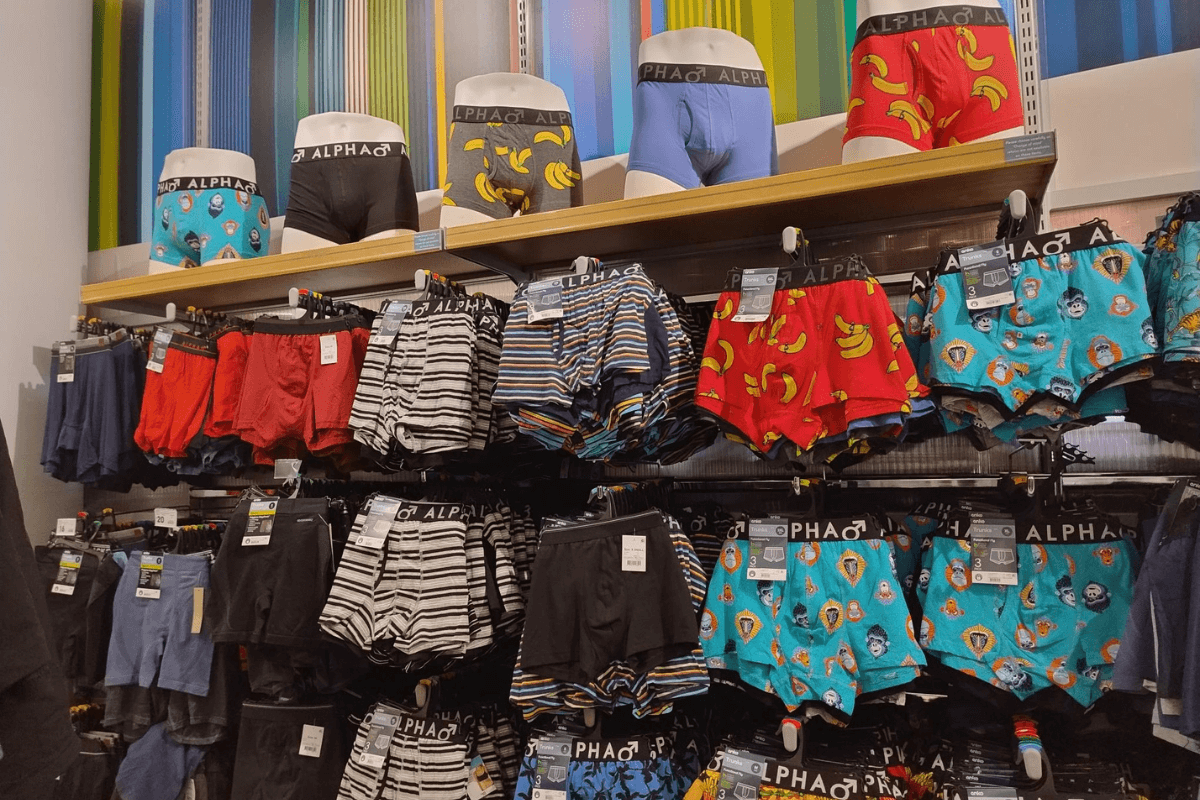
“Jocks” is the Aussie slang term for men’s underwear, specifically briefs.
It’s a casual and commonly used term when talking about everyday essentials.
Examples in sentences:
- “I need to buy some new jocks this weekend.”
- “He was embarrassed to be seen in just his jocks.”
- “Don’t forget to pack a few pairs of jocks for the trip.”
- “He prefers jocks over boxers for comfort.”
- “After swimming, he quickly changed back into his jocks.”
Journo
“Journo” is a casual Australian term for a journalist. It’s often used in a slightly cheeky or familiar way.
Examples in sentences:
- “The journo was quick to get the scoop on the latest story.”
- “As a seasoned journo, she knew how to ask the tough questions.”
- “The local journo was always around to cover community events.”
- “He started his career as a journo with a small regional paper.”
- “The journo had a reputation for uncovering the truth.”
Jumbuck
“Jumbuck” is an old Australian term for a sheep. It’s most famously known from the classic song “Waltzing Matilda.”
Examples in sentences:
- “The farmer rounded up his jumbucks before the storm hit.”
- “There were hundreds of jumbucks grazing in the paddock.”
- “He knew how to shear a jumbuck in record time.”
- “The jumbuck was a vital part of Australia’s wool industry.”
- “‘Waltzing Matilda’ tells the tale of a swagman and a jumbuck.”
Australian slang terms starting with K
Kangaroo
“Kangaroo” is one of Australia’s most iconic animals, known for its powerful hind legs, large tail, and ability to jump great distances. It’s often used as a symbol of the country.
Examples in sentences:
- “We saw a mob of kangaroos hopping across the outback.”
- “The kangaroo is a common sight in the Australian bush.”
- “Tourists love to see kangaroos in the wild.”
- “He almost hit a kangaroo while driving at dusk.”
- “Kangaroos are featured on the Australian coat of arms.”
Kangaroo Court
“Kangaroo Court” is a term used to describe a biased or unofficial court or legal proceeding where the judgment is often predetermined, and the usual rules of justice are ignored.
Examples in sentences:
- “The disciplinary hearing felt like a kangaroo court.”
- “He claimed he was judged in a kangaroo court, without a fair chance.”
- “They held a kangaroo court to settle the dispute, but it wasn’t official.”
- “The trial was nothing more than a kangaroo court.”
- “The decision was made before the kangaroo court even began.”
Kelpie
“Kelpie” refers to an Australian breed of dog, highly regarded for its intelligence and herding abilities. Kelpies are often used on farms to manage livestock.
Examples in sentences:
- “The kelpie rounded up the sheep with incredible speed.”
- “Kelpies are known for their stamina and work ethic.”
- “He trained his kelpie to respond to whistles.”
- “The kelpie is a common sight on Australian farms.”
- “She got a kelpie to help with managing the sheep.”
Knickers
“Knickers” is an Australian term for women’s underwear. It’s a light-hearted and somewhat old-fashioned way to refer to undergarments.
Examples in sentences:
- “She bought a new pair of knickers at the store.”
- “He found it hilarious when his knickers were caught on the clothesline.”
- “She always makes sure her knickers match her outfit.”
- “The laundry was full of socks and knickers.”
- “Don’t get your knickers in a twist!”
Kip
“Kip” is a slang term used to describe a short nap or sleep. It’s often used casually when someone needs a quick rest.
Examples in sentences:
- “I’m just going to have a quick kip before dinner.”
- “He had a kip on the couch after a long day.”
- “A short kip can really help recharge your batteries.”
- “She always has a kip in the afternoon.”
- “Let’s have a kip before heading out tonight.”
Kookaburra
“Kookaburra” is an iconic Australian bird famous for its loud, laugh-like call. It’s often heard in the early morning and is a familiar sound in the Australian bush.
Examples in sentences:
- “The kookaburra’s laugh echoed through the trees.”
- “We spotted a kookaburra perched on a fence.”
- “Kookaburras are known for their unique call.”
- “A kookaburra laughed at dawn, waking everyone up.”
- “The kookaburra is a beloved symbol of Australia’s wildlife.”
Australian slang terms starting with L
Larrikin
“Larrikin” is a term used to describe someone with a mischievous, playful, and carefree attitude.
It often refers to someone who loves to have fun and doesn’t worry too much about rules or conventions.
Examples in sentences:
- “He’s a real larrikin, always joking around.”
- “The larrikin spirit is alive and well in Australia.”
- “She married a larrikin who keeps her laughing.”
- “The pub was full of larrikins having a good time.”
- “His larrikin nature makes him the life of the party.”
Lit
“Lit” is commonly used in Australian slang to describe something that is literally happening, often to emphasize something that seems extreme, surprising, or hard to believe.
Examples in sentences:
- “He was lit on fire during the stunt, but he’s okay.”
- “That party was lit, it was out of control!”
- “She was lit with excitement when she won the competition.”
- “That concert was lit, everyone was having a blast.”
- “The debate got lit when they started discussing politics.”
Lob in
“Lob in” is a casual way to say someone has arrived at a place, usually without much notice or planning.
Examples in sentences:
- “He just lobbed in without any warning.”
- “We lobbed in to see if they were home.”
- “She lobbed in just as we were about to leave.”
- “They often lob in for a quick chat.”
- “He loves to lob in on his mates unannounced.”
Lobster
“Lobster” is Australian slang for a $20 note, referencing its reddish hue, similar to the color of a lobster. It’s a term often used informally when discussing money.
- “Can you lend me a lobster for the cab ride?”
- “I paid him a lobster for the concert tickets.”
- “A lobster won’t be enough to cover the meal.”
- “He handed me a lobster after I helped him move.”
- “That jacket cost me a lobster and a few coins.”
Lolly
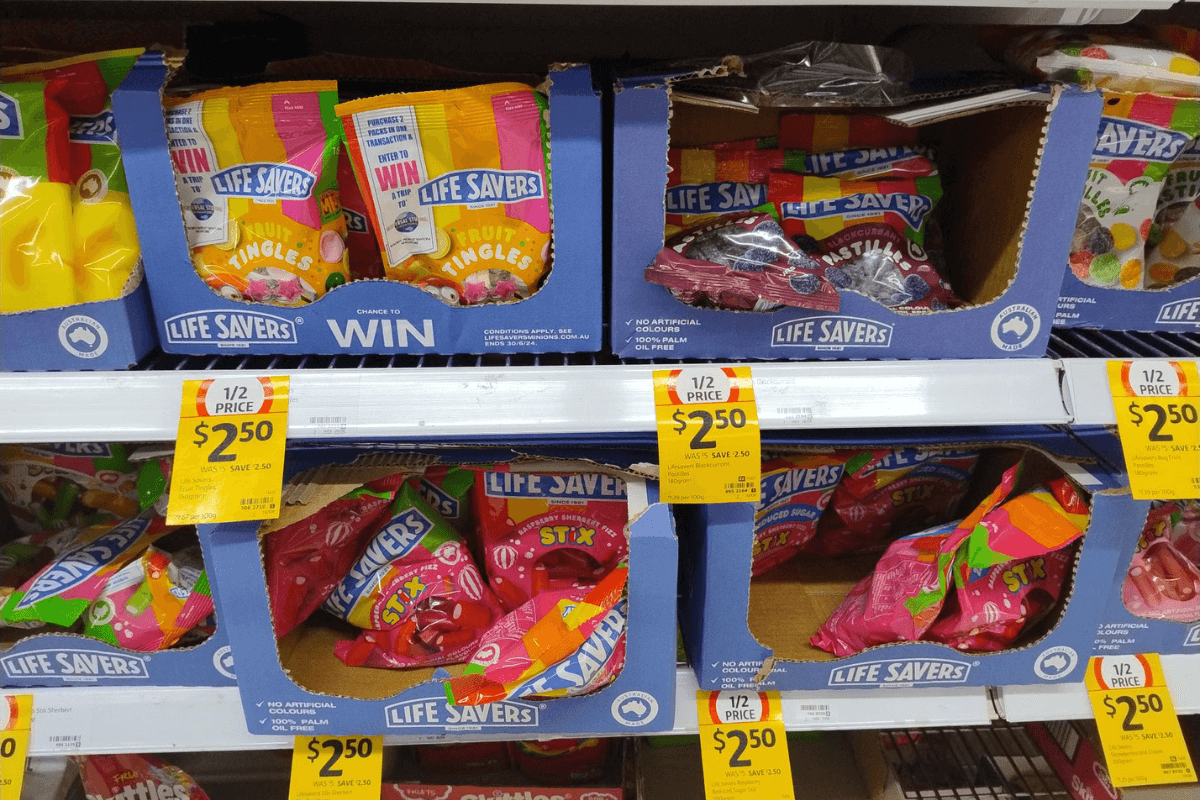
“Lolly” is the Australian term for candy or sweets. It’s a popular word used by both children and adults alike.
Examples in sentences:
- “Can I have a lolly, please?”
- “She gave the kids some lollies after school.”
- “He always keeps a stash of lollies in his desk.”
- “The lolly jar is nearly empty.”
- “They handed out lollies at the parade.”
Lucky Country
“Lucky Country” is a term often used to describe Australia’s wealth, natural beauty, and fortunate circumstances.
However, it’s sometimes used ironically to critique the country’s social or political issues.
Examples in sentences:
- “Australia is often called the Lucky Country.”
- “We truly live in the Lucky Country, with so much to be grateful for.”
- “The Lucky Country isn’t without its problems.”
- “Despite everything, they still call Australia the Lucky Country.”
- “Many immigrants come to the Lucky Country in search of a better life.”
Australian slang terms starting with M
Maccas
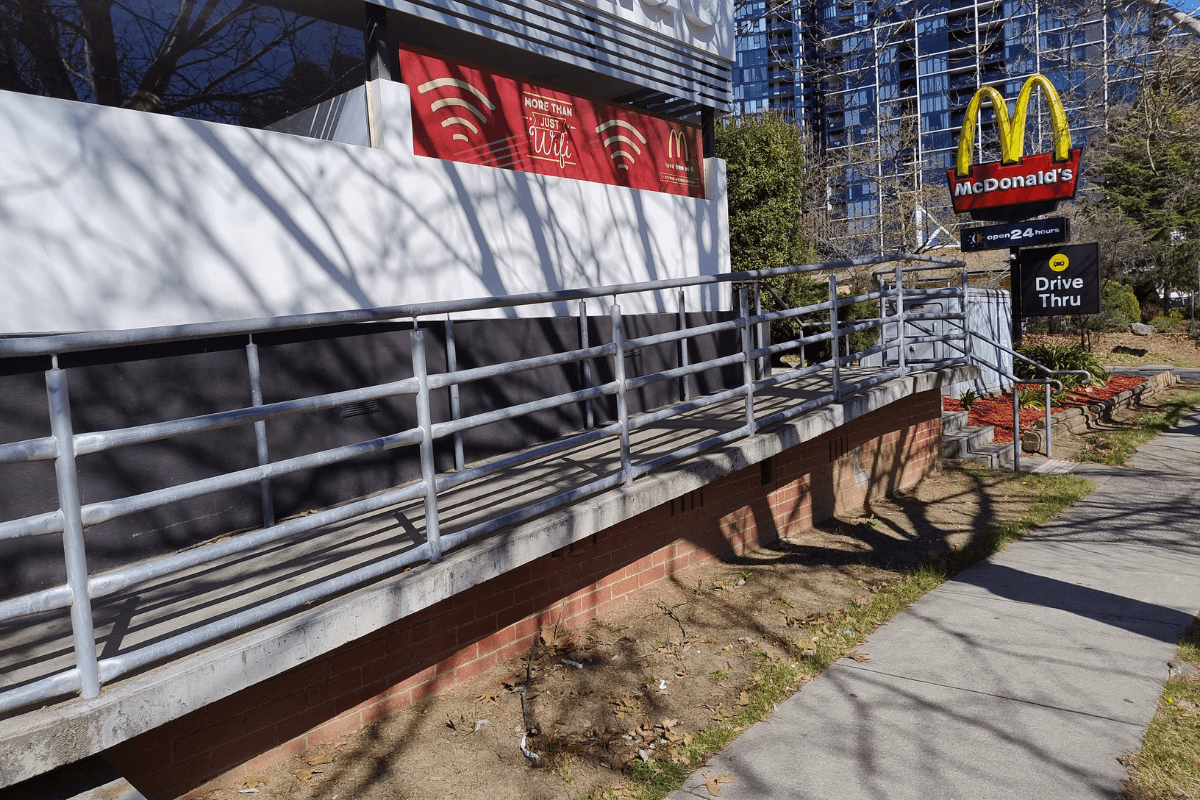
“Maccas” is the affectionate and widely used Australian term for McDonald’s.
It’s so popular that even some McDonald’s locations in Australia feature this name on their signage.
Examples in sentences:
- “Let’s grab some brekkie at Maccas.”
- “Maccas runs are a late-night tradition.”
- “He works the late shift at Maccas.”
- “Kids love the Happy Meals at Maccas.”
- “We stopped at Maccas for a quick bite.”
Maggie
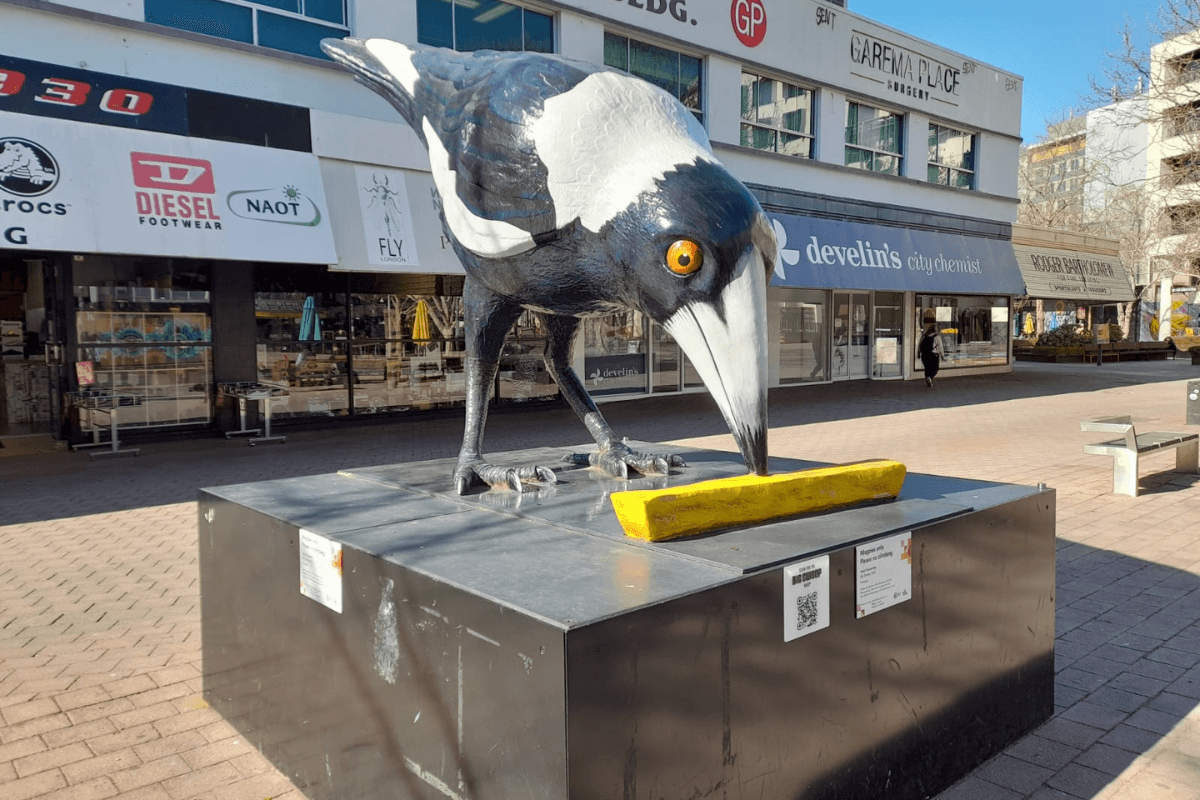
“Maggie” is the colloquial Australian term for a magpie, a black-and-white bird known for its distinct call and swooping behavior during nesting season.
I had a Macca’s once and a Maggie swooped down and knocked the hash brown out of my hand and it landed on the floor. I was well annoyed!
Examples in sentences:
- “Watch out for that Maggie, it’s swooping season.”
- “The Maggie in our yard sings every morning.”
- “I saw a Maggie feeding her chicks today.”
- “That Maggie nearly knocked my hat off!”
- “Maggies can be very territorial.”
Mateship
“Mateship” is a core Australian value that embodies the bond between friends, characterized by loyalty, trust, and mutual support.
It’s particularly significant in the context of military history and the national identity.
Examples in sentences:
- “Mateship is what got them through the war.”
- “The sense of mateship here is strong.”
- “He values mateship above all else.”
- “Mateship was the foundation of their business partnership.”
- “In tough times, mateship is what keeps us going.”
Mob
“Mob” is a versatile Australian term that can refer to any group of people, but it is particularly used within Aboriginal communities to refer to one’s family or clan.
Examples in sentences:
- “My mob is from the Northern Territory.”
- “There was a big mob at the concert.”
- “I’m catching up with my mob this weekend.”
- “That’s a friendly mob of people.”
- “He’s proud of his mob and where he comes from.”
Mongrel
In Australian slang, “mongrel” can refer to a mixed-breed dog, but it is also used figuratively to describe someone with a tough, mean, or aggressive attitude.
It can be a compliment when referring to toughness, particularly in sports, or an insult when referring to someone’s nasty behavior.
Examples in sentences:
- “He’s got a bit of mongrel in him when he’s on the field.”
- “That dog’s a real mongrel, always barking at strangers.”
- “He fought with the mongrel spirit to win the match.”
- “Stop being such a mongrel and help out!”
- “The boss was a real mongrel to everyone today.”
Mozzie
“Mozzie” is the Australian slang term for a mosquito, those pesky insects that are common in the warmer months.
Examples in sentences:
- “The mozzies are out in full force tonight.”
- “Don’t forget to spray for mozzies before heading out.”
- “She got bitten by a mozzie at the BBQ.”
- “Mozzies can carry diseases, so be careful.”
- “We need to put up the mozzie net around the bed.”
Australian slang terms starting with N
Nanna Nap
“Nanna Nap” refers to a short, refreshing sleep taken during the day, similar to a siesta. It’s called a “Nanna Nap” because it’s stereotypically associated with grandmothers, but it’s something people of all ages enjoy.
Examples in sentences:
- “I might take a quick Nanna Nap before dinner.”
- “She feels much better after her Nanna Nap.”
- “He took a Nanna Nap and woke up full of energy.”
- “A Nanna Nap is just what I need after that big lunch.”
- “Even young people can appreciate a good Nanna Nap.”
Nipper
“Nipper” is a term used in Australia to refer to a young child, especially those who participate in surf lifesaving programs. It’s also a general term of endearment for kids.
Examples in sentences:
- “My little nipper just started surf club.”
- “The beach was full of nippers learning how to swim.”
- “He’s been a nipper since he was five.”
- “The nippers are doing a fundraiser this weekend.”
- “She’s a proud mum of two nippers.”
No Drama
“No drama” is a laid-back Aussie phrase that means everything is okay or there’s no issue. It’s often used to reassure someone or to indicate that a situation is under control.
Examples in sentences:
- “Can you help me move this weekend?” – “Yeah, no drama.”
- “Sorry I’m late!” – “No drama, mate.”
- “We’re running low on time, but no drama, we’ll finish on time.”
- “There was a slight delay, but no drama, everything’s sorted now.”
- “If you need anything, just ask. No drama at all.”
No worries
“No worries” is a quintessential Australian phrase that means “it’s okay” or “don’t worry about it.” It’s used to reassure someone that a situation is under control or that their request is not a burden.
Examples in sentences:
- “Thanks for helping out! No worries, mate.”
- “Sorry I’m late! No worries, we haven’t started yet.”
- “Can you pass the salt? No worries, here you go.”
- “No worries if you can’t make it, we’ll catch up later.”
- “He’s always saying no worries, even when things go wrong.”
Nullarbor
The “Nullarbor” is a large, flat, and mostly barren area of land in southern Australia, stretching across South Australia and Western Australia. The name comes from the Latin words “nullus” (no) and “arbor” (tree), meaning “no trees.”
Examples in sentences:
- “We drove across the Nullarbor on our road trip.”
- “The Nullarbor is known for its vast, empty landscape.”
- “Crossing the Nullarbor is a true outback experience.”
- “There’s nothing but blue sky and red earth on the Nullarbor.”
- “The Nullarbor is an iconic part of Australia’s geography.”
Nuddy
“Nuddy” is Australian slang for being naked or in the nude. It’s a playful term often used to describe being unclothed, particularly in informal or humorous contexts.
Examples in sentences:
- “He went for a swim in the nuddy.”
- “Caught him running around in the nuddy.”
- “The kids love to run around in the nuddy after a bath.”
- “There’s a nuddy beach just down the coast.”
- “He accidentally answered the door in the nuddy!”
Australian slang terms starting with O
Ocker
“Ocker” refers to a person who is considered to be uncultured, with a strong Australian accent and mannerisms.
The term is often used humorously or affectionately to describe someone who embodies traditional, stereotypical Australian characteristics.
Examples in sentences:
- “He’s a real ocker, always talking about footy and the pub.”
- “That ocker accent is unmistakable.”
- “She married a bloke who’s a bit of an ocker.”
- “The movie featured an ocker character who stole the show.”
- “He’s proud of his ocker roots.”
Off one’s face
“Off one’s face” is a phrase used to describe someone who is very drunk or high. It implies a state of being so inebriated that the person is not in full control of their actions or awareness.
Examples in sentences:
- “He was off his face at the party last night.”
- “She got off her face after just a few drinks.”
- “They were all off their faces by midnight.”
- “You don’t want to get off your face before the big meeting.”
- “He was so off his face, he didn’t even remember getting home.”
Oldies
“Oldies” is a casual term used to refer to parents or older people in general. It’s often used in a light-hearted or affectionate manner.
Examples in sentences:
- “The oldies are coming over for dinner tonight.”
- “I’m taking the oldies out for a day trip.”
- “We had a BBQ with the oldies on the weekend.”
- “The oldies always have the best stories.”
- “He’s living with the oldies to save money.”
Op Shop
An “Op Shop” is an Australian term for what Americans call a thrift store or the British call a charity shop.
It is usually where people donate items, and others can buy them at a lower cost.
These shops are often run by charities and are a great place to find bargains or unique items.
Two of the more popular op shops in Australia are “Vinnies” and “Salvos”
Examples in sentences:
- “I found a vintage jacket at the local op shop.”
- “She loves shopping at op shops to find hidden treasures.”
- “The op shop always has great deals on second-hand clothes.”
- “He donates old clothes to the op shop every year.”
- “You never know what you’ll find in an op shop.”
Outback
The “Outback” refers to the vast, remote, and often arid interior of Australia. It’s characterized by its rugged landscapes, sparse population, and unique wildlife. The term is synonymous with the idea of the Australian wilderness.
Examples in sentences:
- “We’re planning a trip to the outback next month.”
- “The outback is known for its extreme weather conditions.”
- “You’ll need a 4WD if you’re heading into the outback.”
- “She’s been living in the outback for years.”
- “The outback offers some of the most stunning landscapes in Australia.”
Oz
“Oz” is a popular slang term used to refer to Australia. It’s an affectionate and informal way to refer to the country, often used by locals and visitors alike.
Examples in sentences:
- “Welcome to Oz!”
- “I’m planning a trip around Oz.”
- “Oz is famous for its unique wildlife.”
- “She’s been living in Oz for five years.”
- “Oz has some of the best beaches in the world.”
Australian slang terms starting with P
Pash
“Pash” is a term used in Australia to describe a long, passionate kiss. It’s often used in the context of romantic encounters, particularly among younger people.
Examples in sentences:
- “They had a pash at the party last night.”
- “I saw them pashing outside the cinema.”
- “It was just a pash, nothing serious.”
- “The movie had a big pash scene.”
- “She gave him a pash before he left.”
Pav
“Pav” is a shorthand term for Pavlova, a beloved Australian dessert made from meringue, topped with cream and fresh fruit. It’s a staple at celebrations and family gatherings.
Examples in sentences:
- “Mum made a pav for Christmas this year.”
- “Do you want a slice of pav?”
- “The pav was the highlight of the meal.”
- “I love a good pav with fresh berries.”
- “Her pav always turns out perfectly crisp on the outside.”
Pearler
“Pearler” is a term used to describe something that is particularly good or impressive. It can refer to an event, a comment, or even the weather.
Examples in sentences:
- “That was an absolute pearler of a game!”
- “She came up with a pearler of an idea.”
- “The weather today is a pearler.”
- “He told a pearler of a joke at the pub.”
- “We had a pearler of a time on our trip.”
Pineapple
“Pineapple” is Australian slang for a $50 note, referencing its yellowish hue, similar to the color of a pineapple. It’s a common term used in casual conversation when referring to money.
- “I just found a pineapple in my jacket pocket!”
- “That’ll cost you a pineapple at least.”
- “I lent him a pineapple, and he still hasn’t paid me back.”
- “He threw a couple of pineapples on the table to cover the bill.”
- “Can you spot me a pineapple until payday?”
Pissed
In Australia, “pissed” is commonly used to describe someone who is drunk. It’s a casual, everyday term that’s widely understood.
Examples in sentences:
- “He got completely pissed at the party.”
- “She was pissed after just a few drinks.”
- “We were all pissed by the end of the night.”
- “You don’t want to get too pissed before your speech.”
- “He’s a funny guy, especially when he’s pissed.”
Pommie
“Pommie” (or “Pom”) is a slang term used in Australia to refer to someone from Britain. It’s often used in a playful or teasing manner, especially in the context of friendly rivalries between Australians and Brits.
Examples in sentences:
- “The new guy at work is a Pommie.”
- “There’s a bunch of Pommies staying at the hostel.”
- “He’s always joking about how the Pommies can’t handle the heat.”
- “She’s a Pommie, but she loves living in Oz.”
- “We had a BBQ with a few Pommies last weekend.”
Postie
“Postie” is an affectionate term for a postal worker in Australia. It’s commonly used to refer to the person who delivers the mail, often on a motorbike in suburban areas.
Examples in sentences:
- “The postie just delivered your parcel.”
- “Our postie is always on time.”
- “Say g’day to the postie when you see him.”
- “The postie left a card because we weren’t home.”
- “The kids love waving to the postie every morning.”
Povo
“Povo” is an Australian slang term used to describe someone who is struggling financially or living in poverty. It’s a casual, sometimes humorous or derogatory way of referring to people or situations that involve a lack of money.
Examples in sentences:
- “I can’t afford to go out tonight, I’m totally povo.”
- “That povo meal was all I could afford this week.”
- “They used to live in a povo suburb before they made some money.”
- “I feel povo after paying all my bills.”
- “The povo lifestyle isn’t fun, but it builds character.”
Australian slang terms starting with Q
Quokka
The “Quokka” is a small, herbivorous marsupial found mainly on Rottnest Island near Perth. Quokkas are famous for their friendly nature and the seemingly smiling expression on their faces, making them a popular subject for selfies with tourists.
Examples in sentences:
- “We saw heaps of quokkas on Rottnest Island.”
- “The quokka took a selfie with me!”
- “Quokkas are just the cutest animals in Australia.”
- “You have to visit the quokkas if you’re in Perth.”
- “The quokka’s smile is so adorable.”
Quid
“Quid” is an informal term for the British pound sterling. Although it’s more commonly used in the UK, Australians sometimes use it, particularly older generations or those with British connections.
Examples in sentences:
- “It costs about fifty quid.”
- “He owes me a few quid.”
- “I got paid in quid when I worked in London.”
- “Can you lend me a quid for the bus?”
- “That’s a lot of quid for just a sandwich.”
Quick Smart
“Quick smart” is an Australian phrase meaning to do something immediately or very quickly. It’s often used to convey urgency or the need for swift action.
Examples in sentences:
- “Get that done quick smart!”
- “He left the room quick smart.”
- “You better fix that quick smart.”
- “The boss wants this finished quick smart.”
- “We need to head home quick smart.”
Quokka Selfie
The “Quokka Selfie” has become a viral trend, with tourists taking photos with the friendly marsupials on Rottnest Island. The quokkas’ seemingly happy expressions make them perfect subjects for these photos, and the trend has become a must-do for visitors to the island.
Examples in sentences:
- “I can’t wait to take a quokka selfie on Rottnest Island.”
- “His quokka selfie went viral on Instagram.”
- “Everyone on the trip took a quokka selfie.”
- “The quokka selfie is a must-do in Perth.”
- “We spent the day trying to get the perfect quokka selfie.”
Australian slang terms starting with R
Rack Off
“Rack off” is an Australian slang term used to bluntly tell someone to go away or leave. It’s often used when someone is annoyed or frustrated.
Examples in sentences:
- “Rack off and leave me alone.”
- “He told the pesky salesman to rack off.”
- “If you don’t like it, you can rack off.”
- “They told the troublemakers to rack off.”
- “Just rack off, I’m not interested.”
Ratbag
“Ratbag” is a term used in Australia to describe someone who is a troublemaker or behaves in a mischievous or annoying way. It’s often used in a light-hearted manner, especially when referring to children or friends.
Examples in sentences:
- “He’s a bit of a ratbag, always getting into trouble.”
- “The kids were acting like little ratbags today.”
- “Stop being such a ratbag and behave yourself.”
- “She’s a loveable ratbag, always up to some mischief.”
- “He’s known as the ratbag of the family.”
Razoo
“Razoo” is a term used in Australia to refer to an insignificant amount of money, or none at all. When someone says they don’t have a razoo, it means they’re broke or have no money left.
Examples in sentences:
- “I don’t have a razoo to my name.”
- “He spent all his cash and doesn’t have a razoo left.”
- “She wouldn’t give me a razoo for my troubles.”
- “After paying the bills, there’s not a razoo left.”
- “He worked hard all week and didn’t earn a razoo.”
Rego
“Rego” is an Australian abbreviation for “registration,” commonly referring to the process of registering a vehicle. It’s often mentioned in the context of paying fees or renewing vehicle registration.
Examples in sentences:
- “I need to renew my car’s rego this month.”
- “The rego fees have gone up again this year.”
- “Have you checked when your rego is due?”
- “Don’t forget to pay your rego before it expires.”
- “The mechanic reminded me to sort out my rego soon.”
Rellies
“Rellies” is a casual Australian slang term used to refer to family members or relatives. It’s often used when talking about visits or gatherings with extended family.
Examples in sentences:
- “The rellies are coming over for Christmas lunch.”
- “We’re spending the weekend with the rellies.”
- “Do you have any rellies living nearby?”
- “We’re visiting the rellies up north next month.”
- “His rellies are scattered all over Australia.”
Reno
“Reno” is a popular Aussie abbreviation for “renovation.” It’s often used when talking about fixing up or improving a house, whether it’s a major overhaul or a small touch-up.
Examples in sentences:
- “We’re planning a big reno on the kitchen next year.”
- “He’s been doing weekend renos to add value to his home.”
- “They’re living with the in-laws while the reno is happening.”
- “A fresh coat of paint will do wonders for your reno.”
- “The reno costs ended up being higher than expected.”
Rip Snorter
“Rip snorter” is used to describe something that is exceptionally good or exciting. It’s often used to emphasize how impressive or fantastic something is, be it an event, performance, or just a good time.
Examples in sentences:
- “That was a rip snorter of a game!”
- “We had a rip snorter of a time at the party.”
- “His performance was a rip snorter; the crowd went wild.”
- “The BBQ was a rip snorter, with plenty of good food and laughs.”
- “You’ve got a rip snorter of a story there!”
Ripper
“Ripper” is a term used in Australia to describe something that is fantastic, excellent, or very impressive. It’s a versatile word that can be used to express excitement or approval.
Examples in sentences:
- “That was a ripper of a game!”
- “What a ripper idea, let’s do it!”
- “He told a ripper joke at the party.”
- “This is a ripper deal, don’t miss out.”
- “She’s a ripper of a friend, always there when you need her.”
Roo
“Roo” is the common Australian slang for kangaroo, the iconic marsupial native to the country. Roos are a significant part of Australian wildlife and culture, often seen in the wild or on road signs warning drivers to watch out.
Examples in sentences:
- “We saw a mob of roos on our road trip.”
- “Watch out for roos on the highway at night.”
- “A roo hopped across the golf course while we were playing.”
- “He nearly hit a roo on his way home.”
- “Roos are a common sight in the Australian bush.”
Rooted
In Australia, “rooted” is slang for being extremely tired or exhausted. It can also mean something that is broken or not functioning properly.
Examples in sentences:
- “I’m absolutely rooted after that long day.”
- “The car’s rooted; it won’t start at all.”
- “He was rooted after running the marathon.”
- “My phone’s rooted, I need a new one.”
- “We were all rooted after the hike.”
Australian slang terms starting with S
Salvos
“Salvos” is an affectionate Australian slang term for the Salvation Army, a charitable organization known for helping those in need, including the homeless and disadvantaged.
Examples in sentences:
- “I donated some clothes to the Salvos yesterday.”
- “The Salvos do a lot of good work for the community.”
- “We’re heading to the Salvos op shop to find some bargains.”
- “The Salvos are organizing a charity event this weekend.”
- “I love finding vintage stuff at the Salvos.”
Sandgroper
“Sandgroper” is a colloquial term used to refer to people from Western Australia. The term originally comes from a burrowing insect native to the sandy soils of the region, and it has since been adopted as a proud identifier for Western Australians.
Examples in sentences:
- “He’s a true Sandgroper, born and raised in Perth.”
- “The Sandgropers are known for their laid-back lifestyle.”
- “You can always spot a Sandgroper by their love for the beach.”
- “Being a Sandgroper, she knows all the best spots along the west coast.”
- “The Sandgroper spirit shines through during the annual festivals.”
Sanga
“Sanga” is an Aussie slang term for a sandwich. Whether it’s a simple Vegemite sanga or a more elaborate creation, it’s a staple in Australian lunchboxes.
Examples in sentences:
- “I packed a ham and cheese sanga for lunch.”
- “Nothing beats a bacon and egg sanga on a Sunday morning.”
- “He quickly made a sanga before heading out.”
- “Grab a sanga from the café down the road.”
- “She always makes the best sangas for the picnic.”
Servo

A “Servo” is a common Australian abbreviation for a service station, where you can fill up your car with fuel, grab some snacks, or take care of other car-related needs.
In the UK it might be called a petrol station or a gas station in the US.
Examples in sentences:
- “I need to stop at the servo to fill up the car.”
- “There’s a servo just around the corner.”
- “We grabbed some snacks from the servo on the road trip.”
- “The servo was packed with people getting fuel before the long weekend.”
- “He works the night shift at the local servo.”
Sheila
“Sheila” is a common Australian slang term used to refer to a woman. While it’s an older term, it’s still widely recognized and sometimes used in a casual, colloquial way.
Examples in sentences:
- “That sheila at the café was really friendly.”
- “He’s got a date with a lovely sheila tonight.”
- “The sheilas at the office are planning a night out.”
- “She’s a top sheila, always ready to lend a hand.”
- “A group of sheilas were chatting at the beach.”
Shout
“Shout” is an Australian slang term meaning to buy a round of drinks for a group of people. It’s a common practice in Australian social settings, particularly in pubs.
Examples in sentences:
- “It’s my shout this round.”
- “Whose shout is it next?”
- “He shouted everyone at the bar.”
- “You’ve got the next shout, right?”
- “She’s always generous with her shouts.”
Sickie
“Sickie” is an Australian slang term for taking a day off, typically from work, by claiming to be sick. Sometimes it refers to legitimately being ill, but often it’s used when someone fakes being unwell to get a day off.
Examples in sentences:
- “I’m thinking of pulling a sickie tomorrow to go to the beach.”
- “He called in a sickie, but I saw him at the footy match later.”
- “After working all week, she needed a break and took a sickie.”
- “Don’t pull too many sickies, or the boss will catch on.”
- “I’m feeling under the weather, so I might have to take a sickie.”
Smoko
“Smoko” refers to a short break from work, traditionally taken to have a cigarette or tea. It’s a term widely used in Australian workplaces, especially in trades and labor industries.
Examples in sentences:
- “Let’s take a quick smoko before getting back to work.”
- “The workers had a smoko under the shade of the tree.”
- “I’ll see you after smoko, mate.”
- “Smoko’s over, back to the grind.”
- “During smoko, they discussed their weekend plans.”
Snag
“Snag” is a beloved Aussie term for a sausage, especially when grilled on a barbecue. Whether it’s at a weekend barbecue or a community sausage sizzle, a snag is a staple of Australian cuisine.
Examples in sentences:
- “Throw a couple of snags on the barbie, would ya?”
- “I had a snag in bread at the Bunnings sausage sizzle.”
- “Nothing beats a snag with some onions and sauce.”
- “We’re having snags for dinner tonight.”
- “He’s the master of cooking the perfect snag.”
Sook
In Australia, calling someone a “sook” is a way to tease them for being overly sensitive or complaining too much. When someone is told to “have a sook,” it’s usually a light-hearted way of telling them to stop complaining or crying over something trivial.
Examples in sentences:
- “Don’t be such a sook, it’s just a little scratch.”
- “He’s having a sook because his team lost.”
- “She’s always a bit of a sook when things don’t go her way.”
- “Stop having a sook and get on with it.”
- “The kids had a sook when they couldn’t get ice cream.”
Sparky
“Sparky” is Australian slang for an electrician. The term is a lighthearted nickname for those who work with electrical systems, based on the idea of sparks from electrical work.
Examples in sentences:
- “We need to call a sparky to fix the wiring in the house.”
- “My cousin is a qualified sparky, and he loves his job.”
- “The sparky will be here tomorrow to install the new lights.”
- “After years of training, he finally became a licensed sparky.”
- “The sparky finished the job in no time.”
Stoked
“Stoked” is used in Australia to describe someone who is extremely happy, excited, or enthusiastic about something. It’s a term often used in surfing culture but has become more broadly used.
Examples in sentences:
- “I’m so stoked about the new job!”
- “He was stoked to win the competition.”
- “She’s stoked to be going on holiday next week.”
- “The kids were stoked to see the fireworks.”
- “I’m stoked you could make it to the party.”
Straya
“Straya” is the colloquial and affectionate way Australians often refer to their country, Australia. It reflects the laid-back and informal nature of Aussie culture.
Examples in sentences:
- “Welcome to Straya, mate!”
- “Straya Day is a time for BBQs and fireworks.”
- “He’s proud to call Straya home.”
- “We’re traveling around Straya in a caravan.”
- “Straya’s got some of the best beaches in the world.”
Sunbake
“Sunbake” is an Aussie term that refers to lying in the sun, typically on the beach, in order to tan. Australians often use this term when they’re soaking up the sun for relaxation or to get some color.
Examples in sentences:
- “We’re heading to the beach to sunbake for a few hours.”
- “She loves to sunbake during summer holidays.”
- “Make sure to wear sunscreen if you’re going to sunbake.”
- “After swimming, they laid out on the sand to sunbake.”
- “He got sunburnt after sunbaking all afternoon.”
Australian slang terms starting with T
Ta
“Ta” is a casual way of saying thank you in Australia. It’s often used in informal settings and is considered a friendly, laid-back way to show appreciation.
Examples in sentences:
- “Ta for the help, mate!”
- “Here’s your coffee. – Ta!”
- “Ta for lending me your book.”
- “I’ll see you later, ta!”
- “Ta, that’s just what I needed.”
Tall poppy
“Tall poppy” refers to a successful person who is often criticized or resented by others, particularly in Australia where there’s a cultural tendency to cut down those who stand out too much.
Examples in sentences:
- “He became a tall poppy after winning that big contract.”
- “Don’t be a tall poppy; just keep your head down.”
- “Tall poppy syndrome is strong in this country.”
- “She’s a tall poppy, but she doesn’t let the criticism get to her.”
- “The media loves to bring down tall poppies.”
Tassie
“Tassie” is the affectionate nickname for Tasmania, Australia’s southernmost state. It’s commonly used when referring to anything related to Tasmania, including its residents, also known as “Tassie locals”.
Examples in sentences:
- “We’re planning a trip to Tassie next summer.”
- “Tassie is known for its stunning wilderness.”
- “She’s a Tassie local, born and raised.”
- “Tassie has some of the best seafood in Australia.”
- “He moved to Tassie for a quieter life.”
Thongs

“Thongs” in Australia refer to flip-flops or sandals, which are a staple of Aussie beachwear.
Unlike in other countries, where thongs might refer to a type of underwear, in Australia, it’s all about the footwear.
Examples in sentences:
- “Don’t forget to pack your thongs for the beach.”
- “He was walking around in thongs despite the cold weather.”
- “My thongs broke, so I had to buy a new pair.”
- “You can’t go wrong with thongs on a hot summer day.”
- “Thongs are a must-have for any Aussie wardrobe.”
Throw a Wobbly
“Throw a Wobbly” means to have a tantrum or angry outburst, often over something trivial. It’s a colorful way of describing someone losing their temper.
Examples in sentences:
- “The boss threw a wobbly when the project was late.”
- “Don’t throw a wobbly just because it didn’t go your way.”
- “He threw a wobbly when he found out he was wrong.”
- “She’s prone to throwing a wobbly over little things.”
- “The kids threw a wobbly when they couldn’t go to the park.”
Tin Lid
“Tin Lid” is a rhyming slang term for a kid or child. It’s a playful, informal way of referring to a youngster in Australian slang.
Examples in sentences:
- “The tin lids are playing in the backyard.”
- “She’s got three tin lids at home.”
- “He’s a cheeky little tin lid.”
- “The tin lids were all dressed up for the party.”
- “Looking after tin lids is a full-time job.”
Tinny
“Tinny” can refer to either a can of beer or a small aluminum boat in Australia. The meaning depends on the context, but both are commonly understood in Australian slang.
Examples in sentences:
- “Crack open a tinny and relax by the beach.”
- “We went fishing in the old tinny.”
- “Grab a few tinnies from the fridge.”
- “He’s out on the water in his tinny.”
- “There’s nothing like a cold tinny on a hot day.”
Toey
“Toey” is a term used to describe someone who is anxious, restless, or eager. It can also mean someone who is agitated or on edge.
Examples in sentences:
- “He’s been a bit toey about the exam results.”
- “She’s toey to get started on the new project.”
- “The dog was toey, sensing a storm was coming.”
- “He’s toey because he hasn’t heard back from the job interview.”
- “I’m feeling toey about the big game tomorrow.”
Too Easy
In Australian slang, “too easy” is often used in response to a request or when someone is offering to do something. It’s a way of saying that the task is not a problem at all, or that they are happy to help. It conveys a laid-back and easy-going attitude.
Examples in sentences:
- “Can you grab that for me?” “Too easy!”
- “Thanks for your help.” “Too easy, mate.”
- “Getting this done by tomorrow? Too easy.”
- “I’ll fix it up for you, too easy.”
- “She said it would be too easy to organize the event.”
Top End
“Top End” is a term used to describe the northernmost region of the Northern Territory, including Darwin and the surrounding areas. It’s known for its tropical climate and unique landscapes.
Examples in sentences:
- “We’re heading to the Top End for a holiday.”
- “The Top End is famous for its crocodiles.”
- “She’s lived in the Top End for years.”
- “The Top End has some of the best fishing spots.”
- “It’s always warm up in the Top End.”
Trackie Dacks
“Trackie Dacks” is a slang term for tracksuit pants in Australia. It’s a popular term used to describe comfortable, casual wear, often worn at home or for exercise.
Examples in sentences:
- “I’m just going to lounge around in my trackie dacks today.”
- “She changed into her trackie dacks as soon as she got home.”
- “Trackie dacks are perfect for a lazy Sunday.”
- “He wears his trackie dacks to the gym.”
- “I need to buy a new pair of trackie dacks.”
Trackies
“Trackies” is a shorter, more casual term for tracksuit pants, often used when referring to comfortable, everyday wear.
Examples in sentences:
- “I’m just going to wear my trackies to the shops.”
- “He spends his weekends lounging in trackies.”
- “Trackies are perfect for a cozy night in.”
- “She bought a new pair of trackies for the gym.”
- “I’m living in my trackies this winter.”
Tradie
“Tradie” is an affectionate term for a tradesperson in Australia. This includes anyone who works in trades like plumbing, electrical work, building, and more. Tradies are highly respected for their practical skills.
Examples in sentences:
- “We need to call a tradie to fix the leaky tap.”
- “My brother is a tradie; he’s an electrician.”
- “Tradies are always in high demand.”
- “He’s a tradie, and he’s great at what he does.”
- “The tradie arrived early to start the job.”
True Blue
“True Blue” is a term used to describe someone or something that is genuinely Australian, embodying the values and spirit of the country. It’s a way to say that someone is loyal, fair dinkum, and authentic.
Examples in sentences:
- “He’s a true blue Aussie, born and bred.”
- “That’s a true blue idea, mate!”
- “She’s as true blue as they come.”
- “It’s a true blue tradition in Australia.”
- “You can trust him; he’s true blue.”
Tucker
“Tucker” is an Aussie slang term for food or a meal. It’s often used in rural areas or by older generations, but it’s still a term that’s widely recognized across Australia.
Examples in sentences:
- “We had some great tucker at the barbecue.”
- “I’m starving, can’t wait for some tucker.”
- “What’s for tucker tonight?”
- “The campsite had plenty of tucker to go around.”
- “He packed some tucker for the road trip.”
Australian slang terms starting with U
Underdaks
“Underdaks” is a playful term used to refer to underwear. It’s a combination of “under” and “daks” (which also refers to pants).
Examples in sentences:
- “Make sure to pack your underdaks for the trip.”
- “He bought new underdaks from the store.”
- “The little boy ran around in his underdaks.”
- “She’s got colourful underdaks in her drawer.”
- “I need to do laundry; I’m out of clean underdaks.”
Uni
“Uni” is the Australian shorthand for university. It’s commonly used by students and people when referring to higher education institutions.
Examples in sentences:
- “I’m heading to uni early tomorrow for a lecture.”
- “She graduated from uni last year.”
- “He’s studying engineering at uni.”
- “Uni life is a mix of study and social events.”
- “They met each other while at uni.”
Unit
“Unit” is a term used in Australia to refer to an apartment or flat. It’s commonly used when talking about housing.
Examples in sentences:
- “She just moved into a new unit in the city.”
- “They’re renting a unit close to the beach.”
- “The unit is small but cozy.”
- “He’s looking to buy a unit in the suburbs.”
- “Their unit has a great view of the skyline.”
Up the Duff
“Up the Duff” is a colloquial term used to describe someone who is pregnant. It’s an informal and somewhat cheeky expression.
Examples in sentences:
- “She’s up the duff with her first child.”
- “They were surprised to find out she’s up the duff.”
- “I heard she’s up the duff and due in a few months.”
- “He’s excited about his partner being up the duff.”
- “They’re over the moon because she’s up the duff.”
Ute

“Ute” is short for a utility vehicle, which is a popular type of vehicle in Australia.
It typically has a tray at the back and is used for carrying goods, tools, and other items.
Examples in sentences:
- “He loaded up the ute with tools for the job.”
- “The farmer drove his ute through the paddock.”
- “She bought a new ute for her business.”
- “They took the ute on a road trip across the country.”
- “Aussies love their utes, especially in the outback.”
Australian slang terms starting with V
VB (Victoria Bitter)

“VB” stands for Victoria Bitter, a well-known beer brand in Australia.
It’s one of the country’s most iconic brews, often enjoyed at social gatherings.
Examples in sentences:
- “He cracked open a cold VB after work.”
- “They brought a slab of VB to the barbecue.”
- “VB is a staple beer in many Aussie fridges.”
- “She prefers VB over other brands of beer.”
- “The pub had VB on tap all night.”
Vegemite
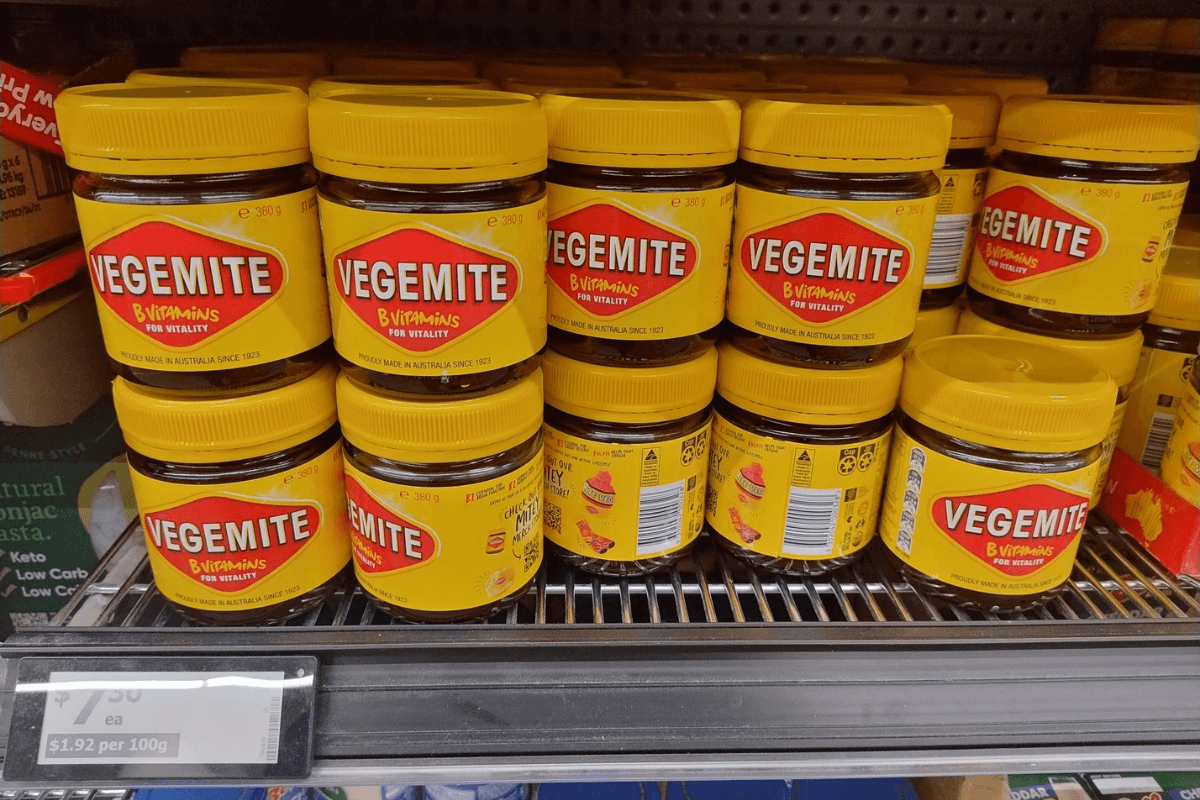
“Vegemite” is an iconic Australian food spread, known for its strong, salty flavor. It’s often spread on toast or crackers and is a staple in many Australian households.
Examples in sentences:
- “I had Vegemite on toast for breakfast.”
- “She loves her Vegemite sandwich for lunch.”
- “Tourists often find Vegemite an acquired taste.”
- “He spread Vegemite thickly on his toast.”
- “Vegemite is a classic Australian snack.”
Vego
“Vego” is the Aussie slang term for someone who is a vegetarian. It’s often used casually in conversation.
Examples in sentences:
- “He’s been a vego for five years.”
- “They’re having a vego barbecue this weekend.”
- “She’s a vego, so we’re making veggie burgers.”
- “Being a vego is pretty common in Australia.”
- “I’m a vego, so I won’t eat the steak.”
Verandah
“Verandah” is a term used to describe a covered area attached to a house, often used for relaxing or entertaining guests.
Examples in sentences:
- “We sat on the verandah watching the sunset.”
- “He’s got a comfy chair on the verandah.”
- “They had a barbecue out on the verandah.”
- “The verandah was decorated with fairy lights.”
- “She loves reading on the verandah in the mornings.”
Vinnies
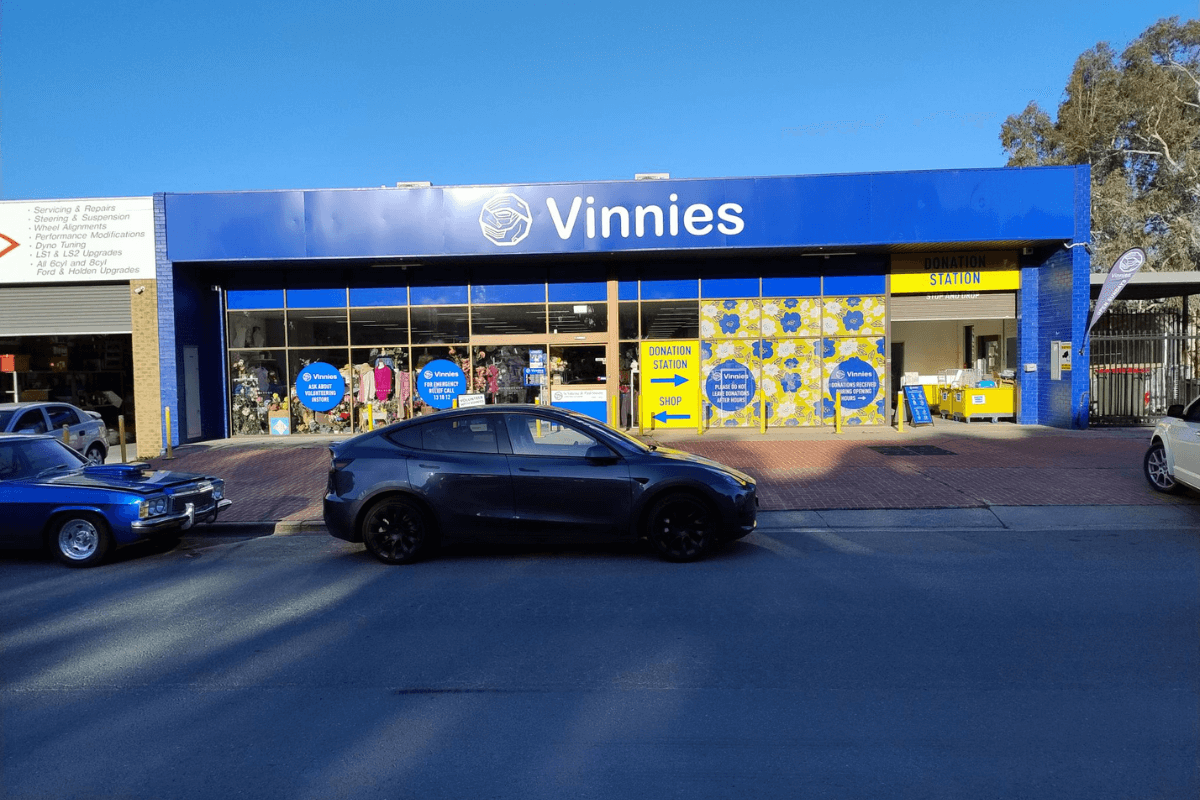
“Vinnies” is the affectionate slang name for the St. Vincent de Paul Society, a well-known charity in Australia that runs thrift stores and supports those in need.
Examples in sentences:
- “I donated my old clothes to Vinnies.”
- “She volunteers at Vinnies every weekend.”
- “I found a great jacket at Vinnies.”
- “Vinnies does a lot of good work in the community.”
- “He picked up some books from Vinnies for a bargain.”
Australian slang terms starting with W
Wag
“Wag” is Australian slang for skipping school or work without permission. It’s commonly used among students who might skip a class or a day of school.
Examples in sentences:
- “He got caught wagging school yesterday.”
- “They decided to wag the last period and head to the beach.”
- “Wagging work is a risky move.”
- “She wagged class to see a movie.”
- “They’re always wagging school, and now they’re in trouble.”
Waltzing Matilda
“Waltzing Matilda” is an iconic Australian folk song that tells the story of a swagman (a traveling worker) who camps by a billabong (a small pond) and ends up in a dramatic confrontation. It’s a significant part of Australian culture and history.
Examples in sentences:
- “‘Waltzing Matilda’ is often considered Australia’s unofficial anthem.”
- “We sang ‘Waltzing Matilda’ at the school assembly.”
- “The lyrics of ‘Waltzing Matilda’ tell a vivid story.”
- “‘Waltzing Matilda’ is known by almost every Australian.”
- “The song ‘Waltzing Matilda’ is played at many national events.”
Wharfie
“Wharfie” is an Australian slang term for a dockworker or longshoreman. These are the people responsible for loading and unloading cargo from ships at ports.
Examples in sentences:
- “My uncle worked as a wharfie down at the docks.”
- “The wharfies went on strike for better working conditions.”
- “Being a wharfie is tough, physical work.”
- “The wharfies unloaded the containers in record time.”
- “He spent years as a wharfie before retiring.”
Whinge
“Whinge” is Australian slang for complaining or whining, often about something minor. It’s a common term used to describe someone who is being overly negative or annoying.
Examples in sentences:
- “Stop whinging and just get on with it.”
- “He’s always having a whinge about something.”
- “She’s been whinging about the weather all day.”
- “They whinged their way through the entire trip.”
- “No one likes a whinger.”
Wog
“Wog” is a term that was historically used to describe Southern European immigrants, especially Italians and Greeks, in Australia. While it was once considered derogatory, many within those communities have reclaimed the term and use it affectionately.
Examples in sentences:
- “He’s proud of his wog heritage.”
- “Wog culture has had a big impact on Australian food.”
- “The wog boy movies are classic Aussie comedies.”
- “She’s part of the wog community in Melbourne.”
- “The term ‘wog’ has been embraced by many second-generation Australians.”
Wombat
“Wombat” refers to a stocky, burrowing marsupial native to Australia. The term can also be used affectionately or humorously to describe someone who is stubborn or tough.
Examples in sentences:
- “We saw a wombat crossing the road last night.”
- “He’s as stubborn as a wombat.”
- “Wombats are known for their powerful digging skills.”
- “The park is home to a few wombats.”
- “She called him a wombat for being so stubborn.”
Woop Woop
“Woop Woop” is a humorous Australian slang term for a remote, isolated place far from civilization. It’s often used to describe any location that is seen as being in the middle of nowhere.
Examples in sentences:
- “He lives way out in Woop Woop.”
- “The campsite was practically in Woop Woop.”
- “We got lost and ended up in Woop Woop.”
- “It’s a long drive out to Woop Woop.”
- “They moved to some place in Woop Woop.”
Wowser
“Wowser” is an Australian term used to describe someone who frowns upon fun, drinking, or anything they consider indulgent. They are often seen as overly strict or puritanical.
Examples in sentences:
- “Don’t be such a wowser, join us for a drink.”
- “The wowsers in the community were outraged by the new pub.”
- “He’s a bit of a wowser, never likes to have fun.”
- “The wowser brigade tried to shut down the music festival.”
- “She’s always been a wowser when it comes to parties.”
Australian slang terms starting with Y
Yabber
“Yabber” is an Aussie term used to describe someone who talks a lot, often in a lively or continuous manner. It’s the kind of word you’d use when someone is having a good, long chat.
Examples in sentences:
- “They were yabbering on about the weekend for hours.”
- “She loves to yabber on the phone every night.”
- “Stop your yabbering and get on with it!”
- “The kids were yabbering away in the backseat.”
- “They sat around the campfire, yabbering until dawn.”
Yabby
“Yabby” refers to a freshwater crayfish commonly found in Australia’s rivers, dams, and lakes. Yabbies are often caught for food or used as bait when fishing.
Examples in sentences:
- “We caught a bucket full of yabbies down by the dam.”
- “Yabby fishing is a fun weekend activity for the kids.”
- “He cooked up a yabby feast after the big catch.”
- “The yabby traps were overflowing after the rain.”
- “She loves making yabby curry when the season is right.”
Yank
“Yank” is an Australian slang term used to refer to someone from the United States. It’s often used in a casual or humorous way.
Examples in sentences:
- “A group of Yanks were touring the outback.”
- “He’s a Yank, but he loves Aussie rules football.”
- “The Yank tourists were amazed by the kangaroos.”
- “She married a Yank and moved to New York.”
- “The Yanks brought some of their culture to Australia.”
Yeah, nah
“Yeah, nah” is an Aussie expression that starts with an agreement or acknowledgment (“Yeah”) but ends with a disagreement or refusal (“nah”). It’s a common and friendly way to say “no” without being too direct.
Examples in sentences:
- “Do you want to go out tonight? Yeah, nah, I’m too tired.”
- “Yeah, nah, I don’t think that’s a good idea.”
- “Yeah, nah, I’m not really into that.”
- “He asked if I liked the movie, and I said, ‘Yeah, nah, it wasn’t great.’
- “Yeah, nah, I’ll pass on that.”
Yobbo
“Yobbo” is used to describe someone who behaves in a rough or uncivilized manner. It’s often used for people who are loud, disruptive, or generally obnoxious.
Examples in sentences:
- “A bunch of yobbos were causing trouble at the footy match.”
- “He was acting like a yobbo at the party.”
- “Don’t be such a yobbo in front of the guests.”
- “The pub was full of yobbos last night.”
- “She called him a yobbo for his rude behavior.”
Australian slang terms starting with Z
Zebra Crossing

“Zebra crossing” is a term used in Australia to describe a pedestrian crossing on the road that is marked with black and white stripes, resembling the pattern of a zebra.
These crossings give pedestrians the right of way over vehicles.
Examples in sentences:
- “Make sure you use the zebra crossing to get across the road safely.”
- “Drivers must stop at a zebra crossing if someone is waiting to cross.”
- “There’s a zebra crossing near the school for the kids.”
- “He nearly got hit because he didn’t use the zebra crossing.”
- “The zebra crossing was repainted to make it more visible.”
Zinger
“Zinger” is used in Australia to describe a witty or sharp remark, often one that is surprising or humorous. It’s the kind of comment that catches people off guard in a conversation.
Examples in sentences:
- “He always has a zinger ready during meetings.”
- “That was a real zinger, everyone burst out laughing.”
- “She threw in a zinger during the debate.”
- “His zingers are the highlight of the conversation.”
- “Watch out, she’s known for her zingers.”
Zonked
“Zonked” is Australian slang used to describe someone who is extremely tired or exhausted, often to the point of being unable to function properly.
Examples in sentences:
- “I’m completely zonked after that long day at work.”
- “She was zonked out on the couch after the hike.”
- “We were all zonked by the time we finished moving.”
- “He’s too zonked to come to the party tonight.”
- “I feel zonked after staying up all night.”

